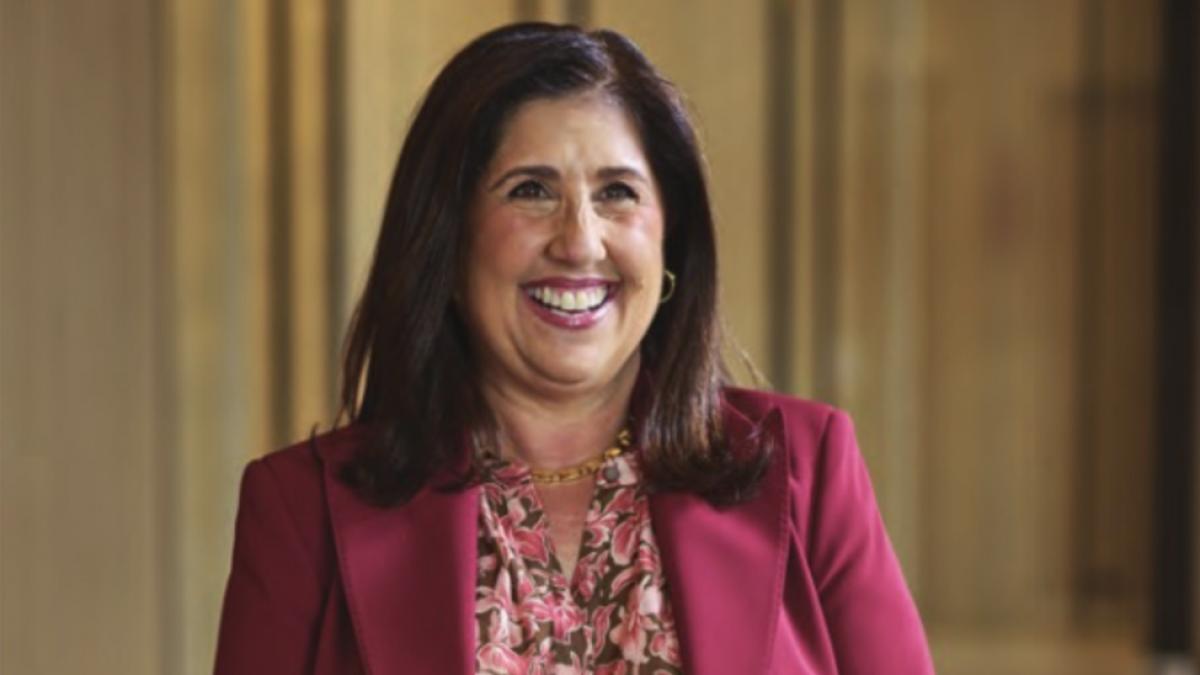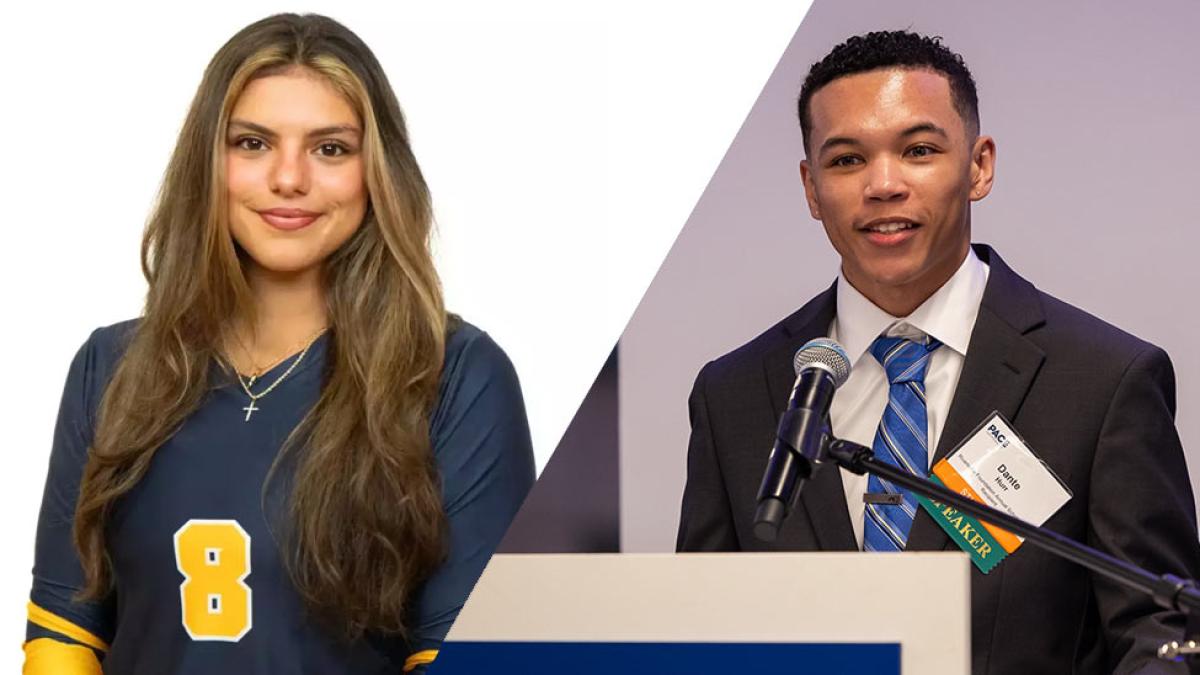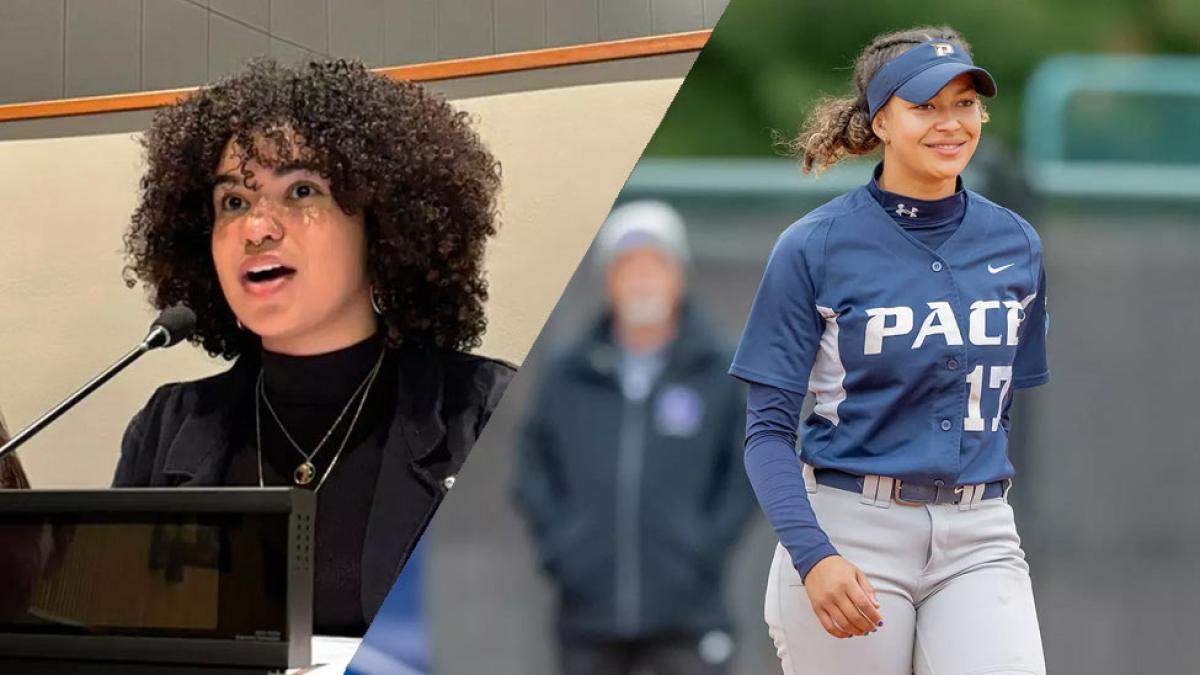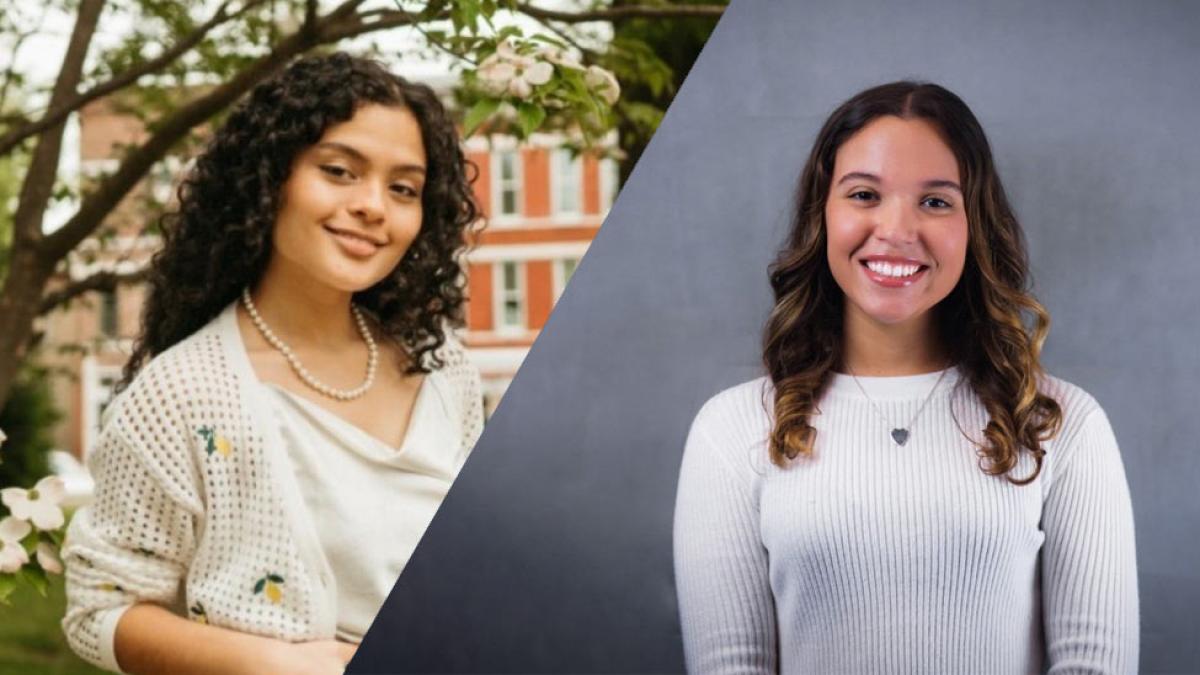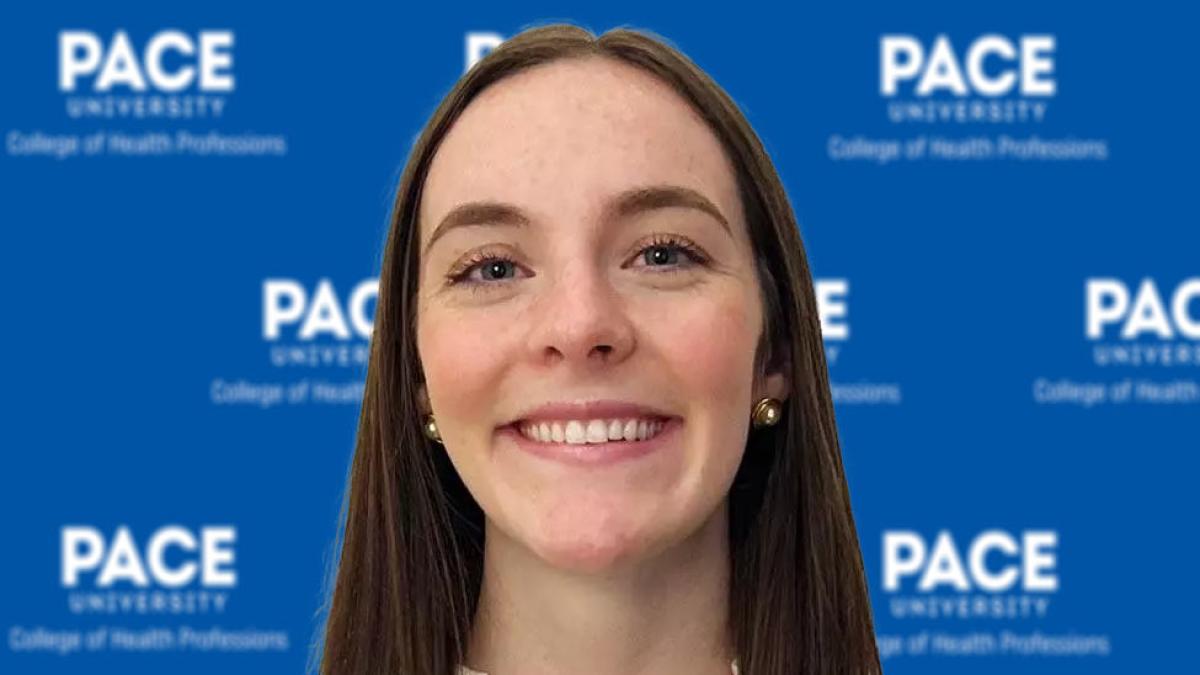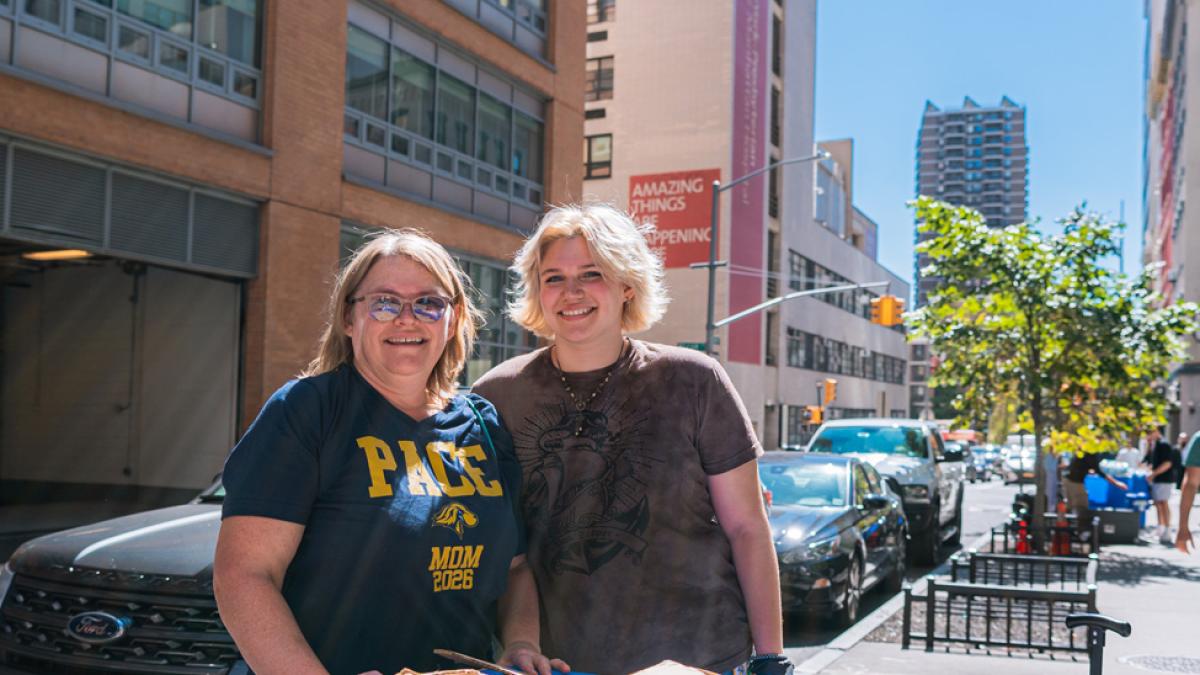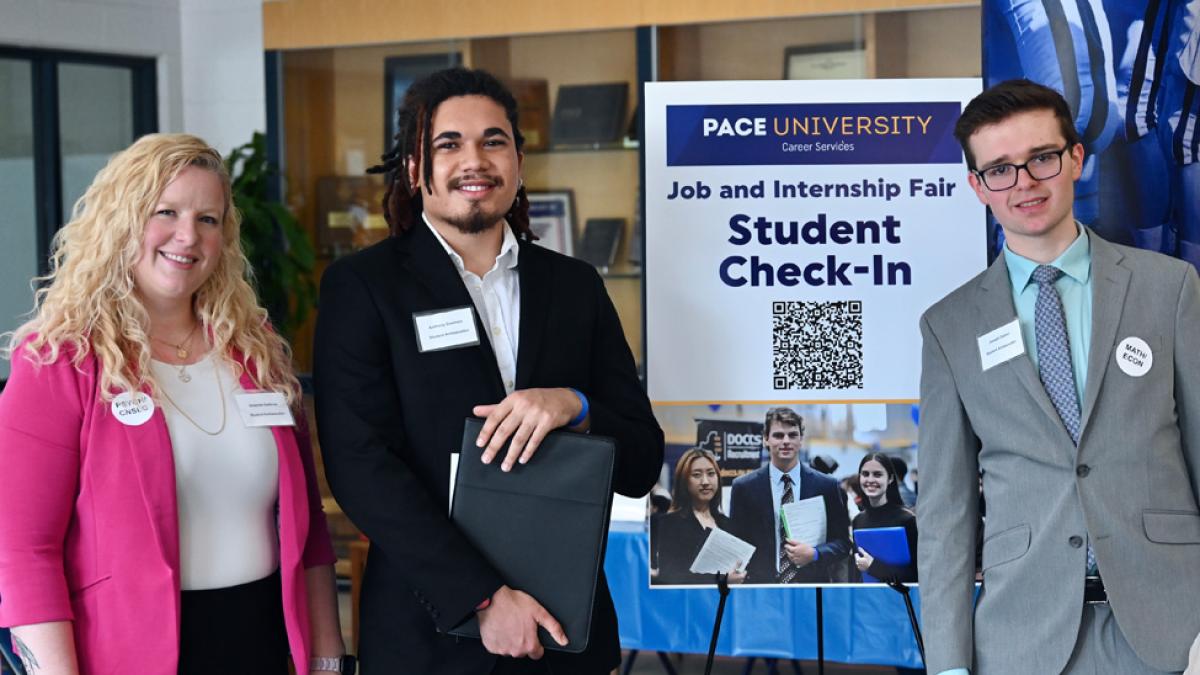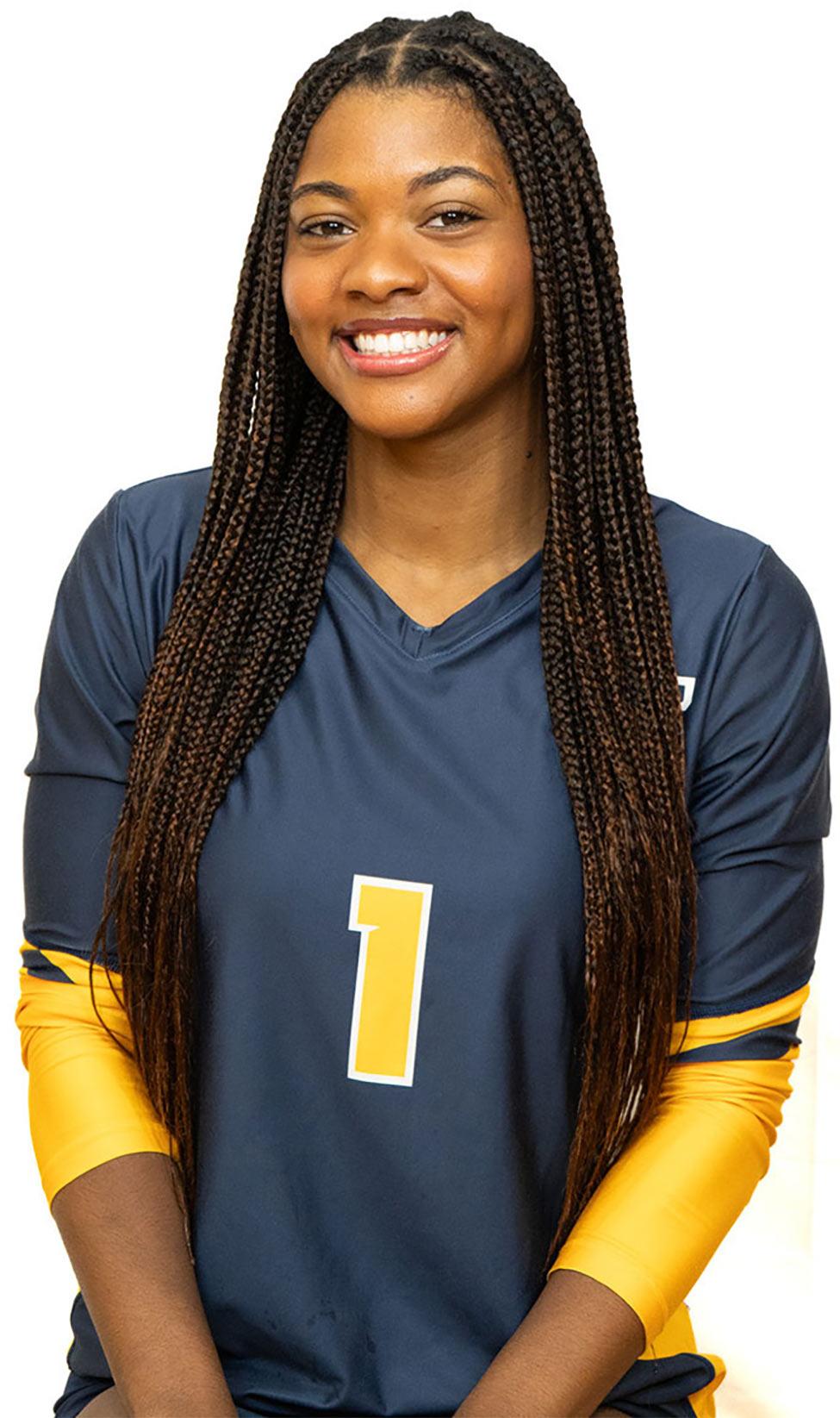
Ready for the Future: The Class of 2025 Boldly Goes Forth
As the Class of 2025 crossed the stage on May 19 and May 20, graduating students shared their plans for the future and reflected on their most memorable moments from their time at Pace—from meaningful mentorship from professors to career-altering courses to unforgettable extracurricular experiences.
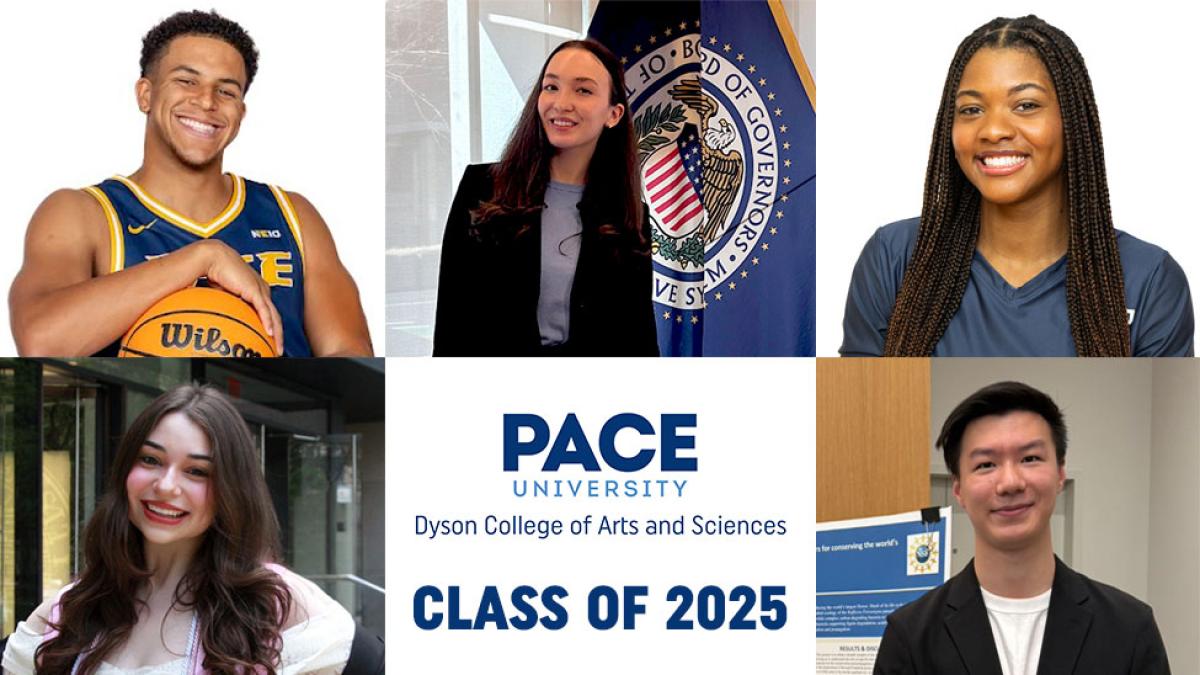
As the Class of 2025 crossed the stage on May 19 and May 20 at the USTA Billie Jean King National Tennis Center, graduating students shared their plans for the future and reflected on their most memorable moments from their time at Pace—from meaningful mentorship from professors to career-altering courses to unforgettable extracurricular experiences.

Morgan Amos
Biochemistry, BS
Pursing a PhD at Rutgers University
What research and internship opportunities did you have as a student?
I worked with Assistant Professor Karen Caldwell, PhD, on a research project on methamphetamine contamination within homes, which was funded by Pace’s Center for Undergraduate Research Experiences (CURE). Professor Caldwell has been a great mentor, giving me the confidence to pursue a future in research and supporting me throughout the graduate school application process. During the summers of 2023 and 2024, I interned at the National Institutes of Health’s National Institute on Aging, in Baltimore, Maryland, conducting computational biomedical research on two different studies involving aging and aging-related diseases.
How has being a student-athlete been meaningful to you?
The experience of playing defensive specialist on the women’s volleyball team was extremely rewarding. I have met some of my best friends on the team and have matured so much as a young adult. Adapting to my academic and athletic schedules was hard at times but has also taught me some of the best lessons. I also had the privilege to be the co-captain my last year, alongside fellow senior Abby Robertson. It was an honor and I had a great time in that role.
What are your post-graduation plans?
I am pursuing my doctoral degree at Rutgers University in their biomedical engineering program and with a concentration in binging and bioinstrumentation. I want to continue to be involved with biomedical research, specifically within engineering and neuroscience, and my career goals are to be a biomedical engineer for surgical innovation.
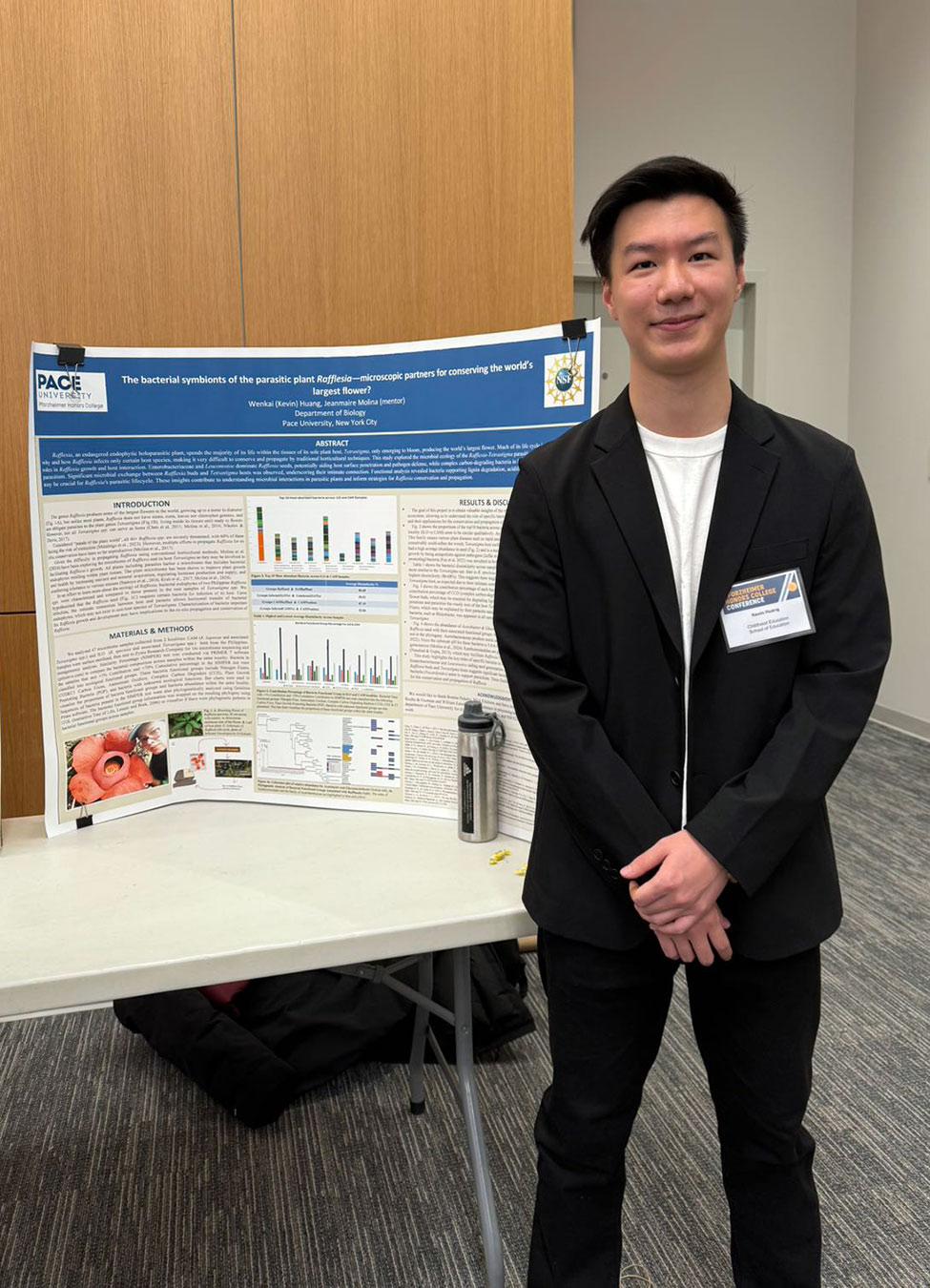
Kevin Huang
Childhood Education/Biology, BS
Pursuing a PhD at Penn State
Why did you pursue your major/degree program?
I chose an education major because I enjoyed working with children in summer camps in Shanghai, China, where I am from. Biology was also one of my favorite subjects in high school, and when I realized my passion for research in my junior year at Pace, I continued with my education major in the School of Education and enrolled in as many biology and chemistry courses in Dyson College of Arts and Sciences as possible. Pace came up on my radar because one of my best friends had been admitted, and, since it offered an education major (my primary interest at the time), I applied and decided to enroll.
Which faculty member(s) had the most impact on your experience?
In my sophomore year, Professor Eric Brenner, PhD, introduced me to research, and, with funding from Pace’s Provost Office, I presented my work on plant movement in his lab at the National Conference of Undergraduate Research in Long Beach, California. In my junior year, Professor Jeanmaire Molina, PhD, funded me, through her National Science Foundation grant, to attend the world’s largest plant biology conference, the American Society of Plant Biologists, in Hawaii, where I shared our research on the endangered Rafflesia plant. Additionally, I have co-authored two papers with her; one published in Current Plant Biology, and another in EvoS Journal: Evolutionary Studies and Higher Education. At a conference at the WPUNJ Symposium at William Paterson University, funded by the Biology department, I presented posters for my research with both Professors Brenner and Molina, and each won second place in their respective categories.
What are your post-graduation plans?
I will be joining Penn State’s Plant Biology PhD Program to continue pursuing my passion in plant biology research.
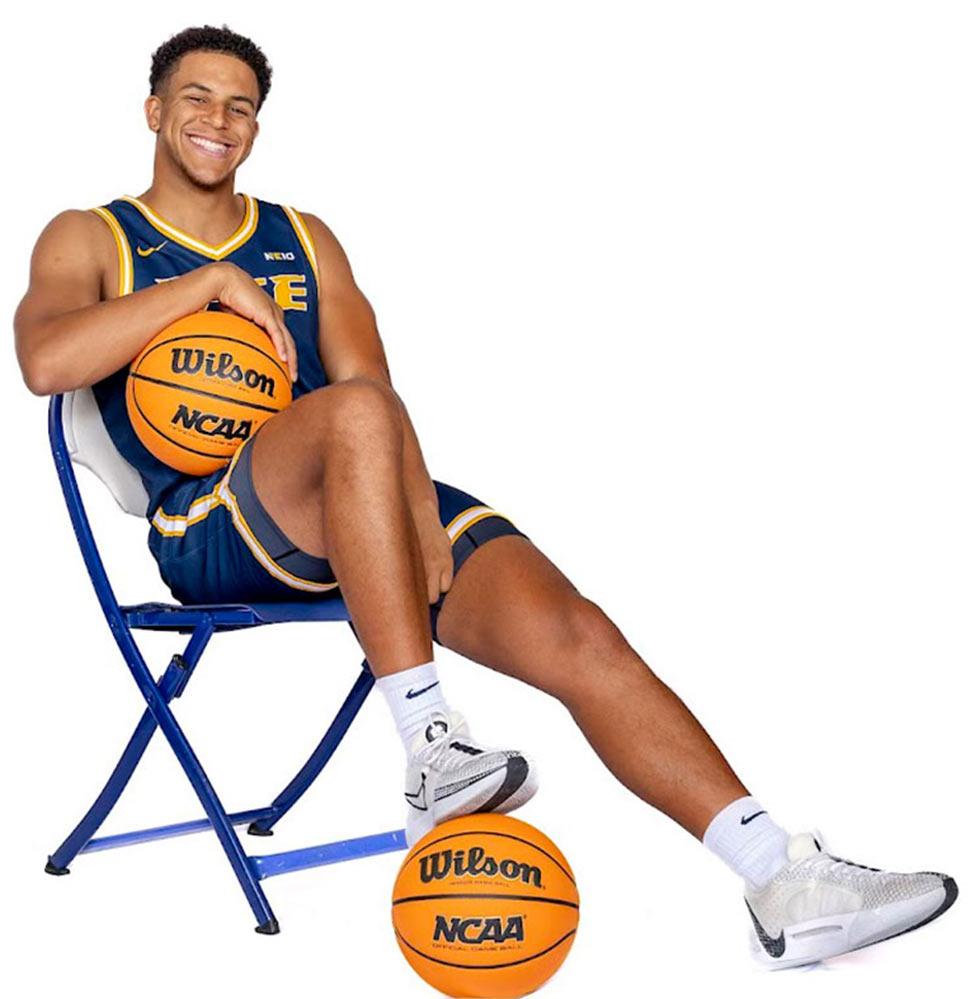
Jaden Kaely
Communications, BA
Pursuing an MBA at Pace University
What were your favorite course(s) and why?
My favorite course was Basic American Sign Language (ASL) with Professor Emmanuel Azodeh. Through it, I learned about the significant history of Deaf culture and was embraced by the Deaf community through my professor and other students. We were not only a class, but a growing testament to culture and the importance of acceptance and understanding of all types of people. ASL was not taught as a true disability, but rather a growing area of knowledge that is becoming more valuable and modernized into today’s world.
Which faculty member(s) had the most impact on your academic experience?
One of my most impactful professors was Samuel Ravech, Sports Journalism and Sports Broadcasting. An active ESPN broadcaster and PlayxPlay analyst, he provided insight into the sports and entertainment industry and helped encourage my career pursuits by providing both meaningful criticism and praise for my work in class. It taught me to be confident in my voice and even inspired me to be the public address announcer of athletic games on campus.
What are your post-graduation plans?
In fall 2025, I will be returning to Pace to pursue a general MBA in the Lubin School of Business. I was able to complete my undergraduate degree in just three years with transfer credits, and with this graduate opportunity, I will be returning for my fourth and final year of eligibility while a part of the Pace men’s basketball team. Being a student-athlete at Pace has been wonderful and I look forward to pursuing endeavors that come with furthering my education next year.
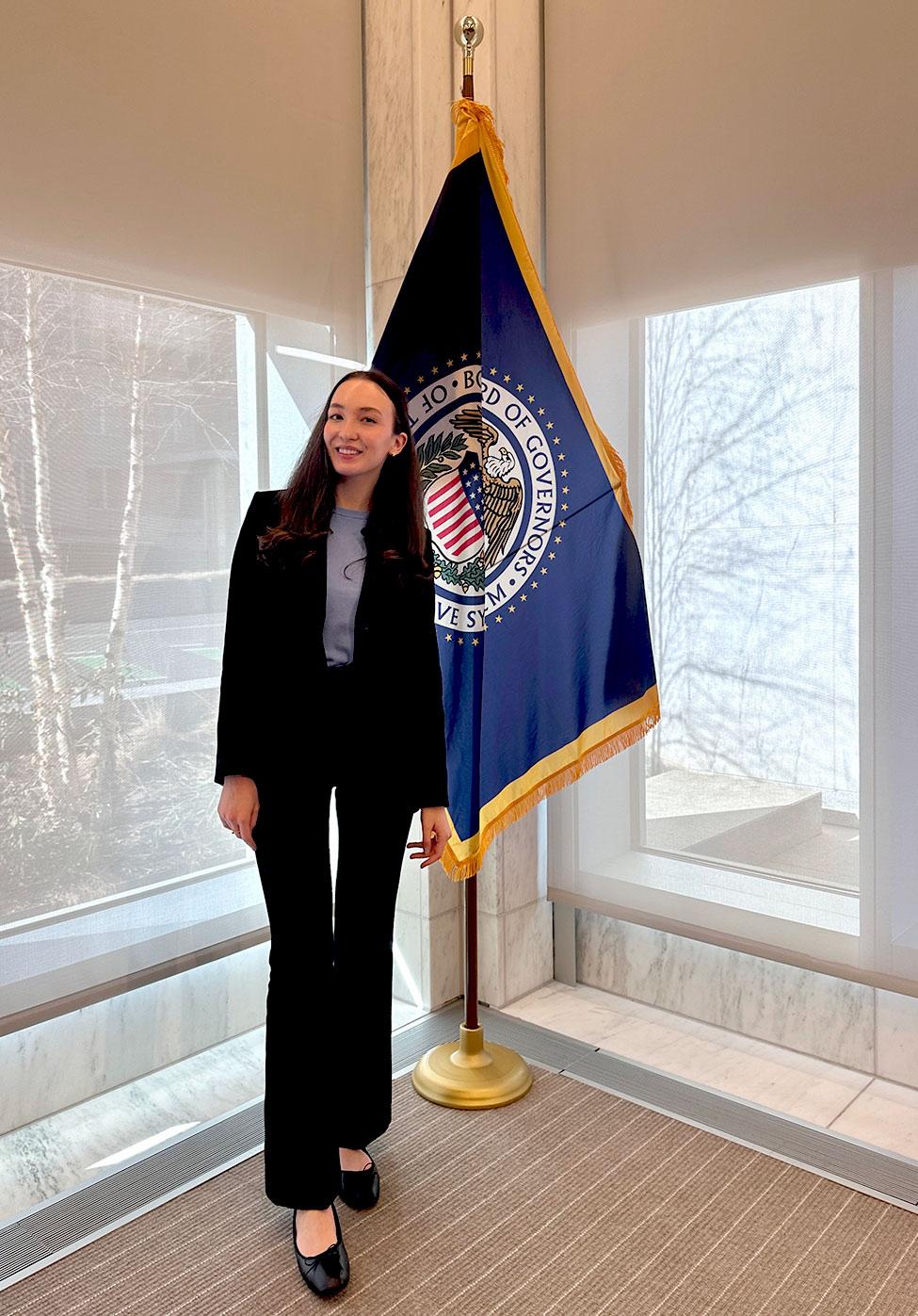
Viktoriia Yevtushenko
Business Economics, BS
Pursuing a master’s degree at Columbia University
Why did you pursue your major/degree program?
I began my studies at Pace as a marketing major but quickly realized that what I enjoyed most were the courses involving data, statistics, and analysis. I started exploring the Economics Department and was impressed by how much it had to offer: strong academics, supportive professors, and opportunities to learn outside of the classroom. Switching to economics ended up being the best decision I made, helping me grow in ways I didn’t expect.
Which faculty member had the most impact on your experience?
Professor Anna Shostya, PhD, made the biggest impact on my experience at Pace. She genuinely cares about her students, not just academically, but personally, and thanks to her support, I was able to complete a UN Millennium Fellowship that was very personal to me. My project, The War Through Children’s Eyes, focused on raising awareness on how the war in Ukraine has affected children, especially their education and emotional well-being. We gave these children a chance to express their experiences through artwork, accompanied by short stories about their lives. We then organized an exhibit on the New York City campus to showcase their work and share their voices with the Pace community.
What are your post-graduation plans?
After graduation, I’ll be attending Columbia University to pursue a master’s degree in quantitative methods in the social sciences, with a concentration in economics. I’m incredibly excited for this next chapter, and I know I wouldn’t be here without the education and support I received at Pace. The Economics department gave me a strong foundation, encouraged my curiosity, and gave me the tools to take my interests further.
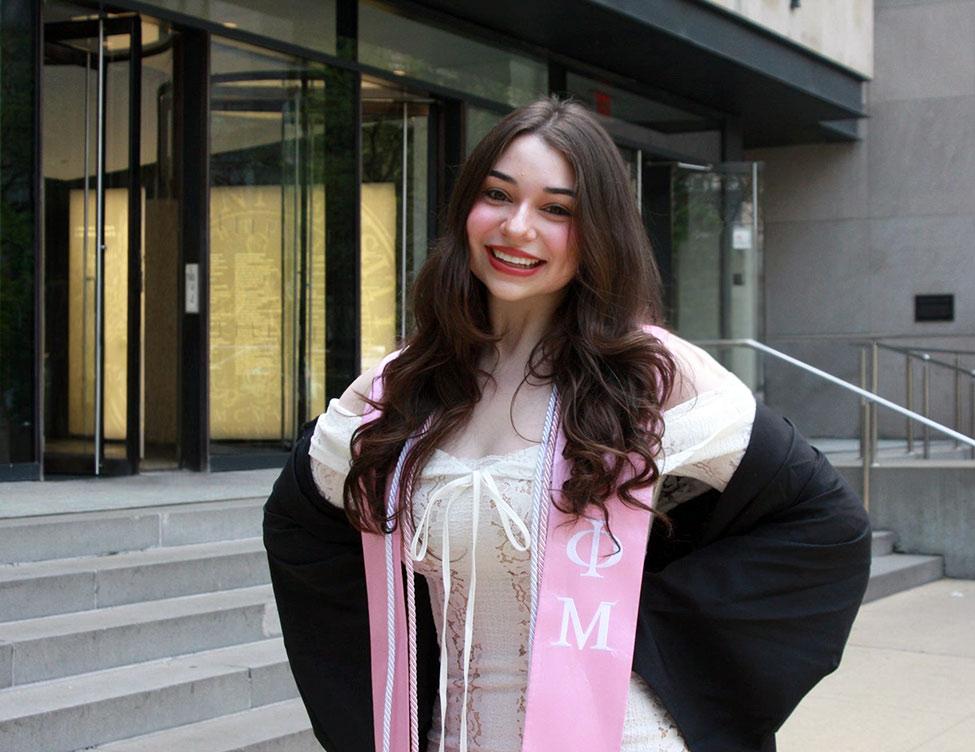
Kaitlyn Weinerman
BA in Psychology
Pursuing a master’s degree at Columbia University
Why did you pursue your major/degree program?
I pursued a major in Psychology because I want to make a positive impact on my community, and service those who truly need it. It has always been and will always be my passion.
What were your favorite course(s) and why?
My favorite courses have been Sexuality, Reproduction and the Family, Psychology of Civic Engagement, and Group Relations and Interview Techniques. These courses helped me fully realize my passion for service and psychology, and how we relate to the world around us. Taught by amazing professors, these courses helped me grow and shaped my view of the world.
What are your post-graduation plans?
I will be attending Columbia University for a Master of Science in Social Work (MSSW). I will be continuing my research on risky sexual behavior in college students, and I plan on working in hospitals, agencies, schools, and shelters throughout my career in social work.
More Pace Go-Getters
Valedictorian speaker Georgette Cosentino is a standout student-athlete and neuroscience researcher. Opportunitas speaker Dante Hurr is a trailblazing first-gen graduate and tech leader whose journey from hardship to empowerment is nothing short of inspiring. Hear their stories at the 2025 Commencement.
Two extraordinary Setters will be honored with Pace’s prestigious 2025 Trustee Award at this year’s Commencement ceremony. Meet Layne Davis and Brianna Shea, and discover how they’re already making their mark.
Each year, the Community Service Award shines a light on students who turn vision into action and passion into impact. This year, we are proud to honor Jasmine Cintron-Soto ’25 and Jamie-Lynn Figueroa ’25 for their tireless advocacy and their commitment to building a stronger, more inclusive community.
Pace University Joins National Undergraduate-to-PhD Computer Science Research Program
Pace University’s Seidenberg School of Computer Science and Information Systems has joined the Undergraduate Research to PhD (UR2PhD) mentorship program, a nationwide initiative from the Computer Research Association’s (CRA) aimed at providing students with support to develop into strong researchers.
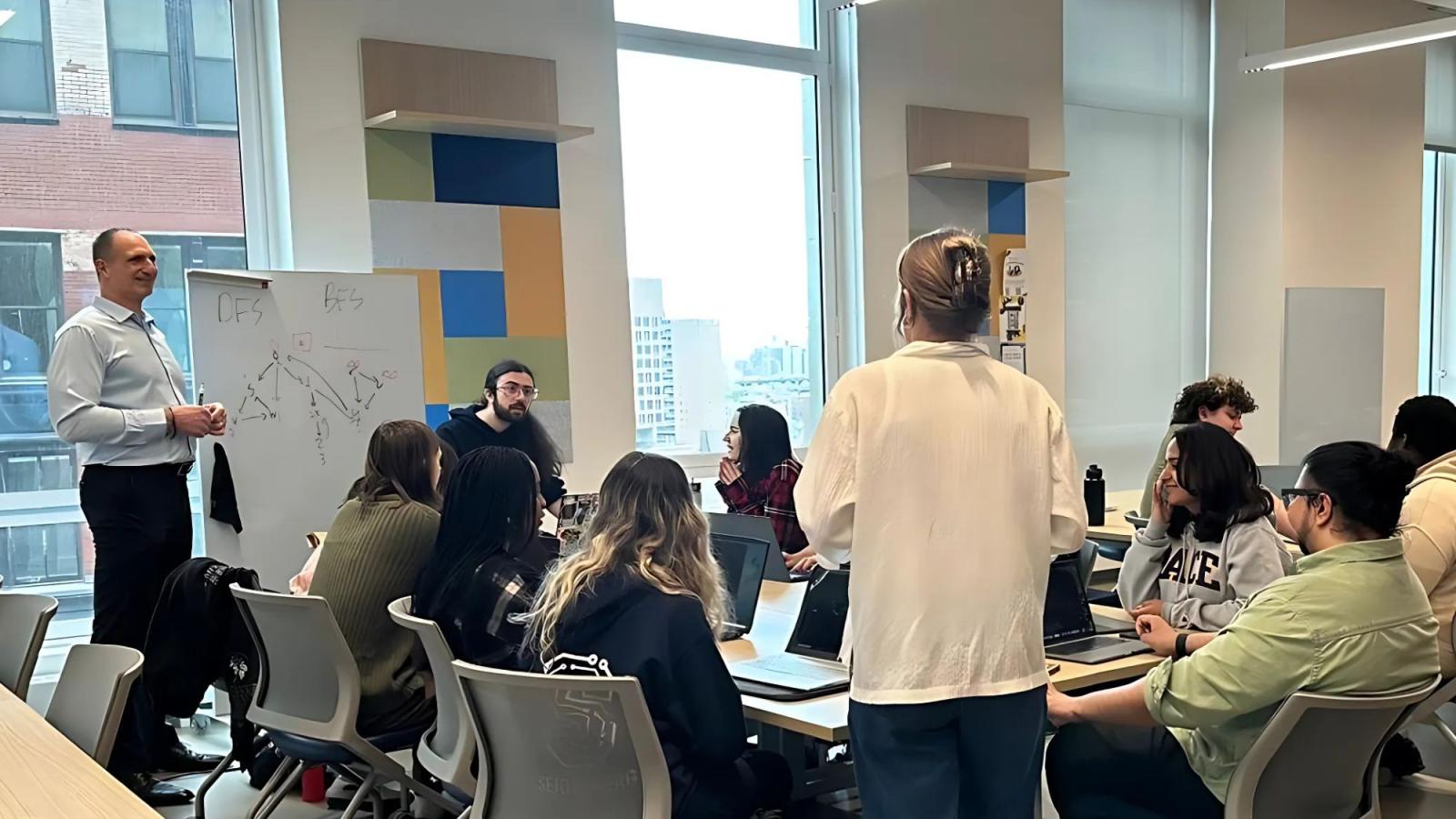
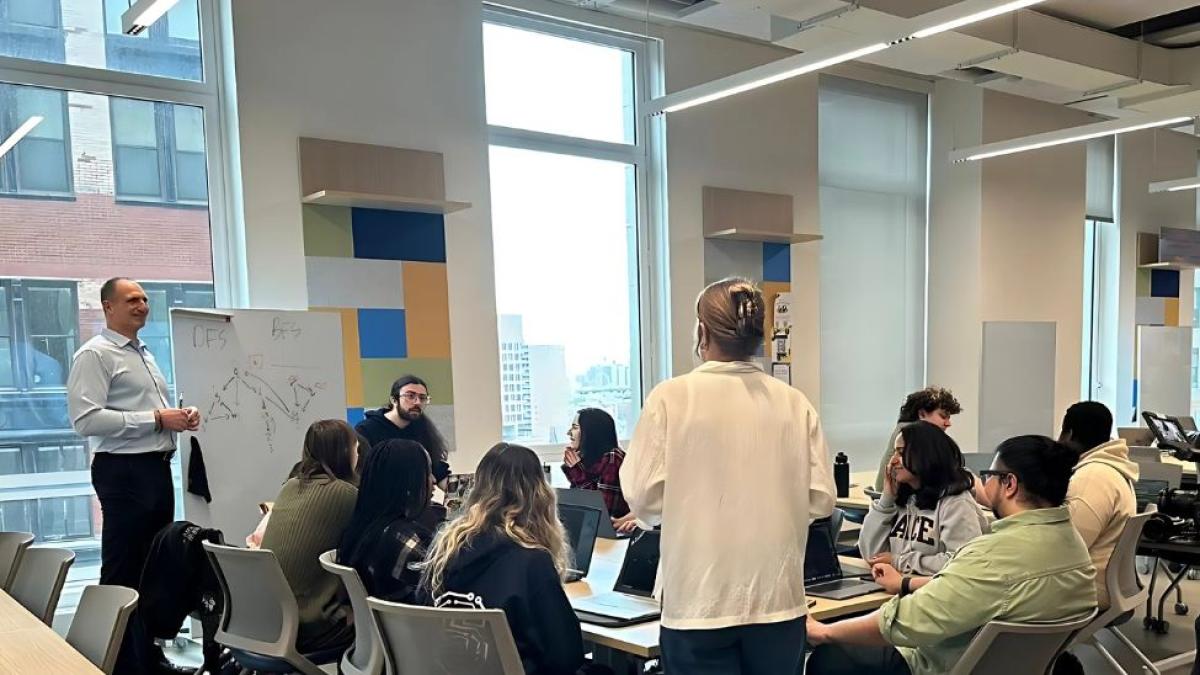
Pace University’s Seidenberg School of Computer Science and Information Systems has joined the Undergraduate Research to PhD (UR2PhD) mentorship program, a nationwide initiative from the Computer Research Association’s (CRA) aimed at providing students with support to develop into strong researchers.
The program connects undergraduate students to high-quality research opportunities, pairing them with graduate mentors and faculty to support their development of key computer science research skills. Additionally, the program connects undergraduate students with the experiential learning and research opportunities that can lead to graduate study.
At Pace, UR2PhD will be embedded within the Seidenberg Summer Undergraduate Research (SSUR) program—an annual, hands-on research experience for undergraduate students. This summer’s cohort includes 15 undergraduate students, six graduate student mentors, and eight faculty advisors.
“This is the first year that graduate students will be involved in SSUR,” said Christelle Scharff, PhD, professor of computer science, who has led SSUR for four years and applied for Pace to join UR2PhD. “The program is important for our students and for experiential learning at Pace.”
During the program, undergraduate students will take a research skills course designed to reinforce their understanding of the research process, enhance written and oral communication, promote teamwork and collaboration, and foster a computer science research identity within the broader research community. They will also learn to consider the social, ethical, and cultural impacts of their computer science research projects.
Pace faculty participating in the program include professors Krishna Bathula, Matt Ganis, Carmine Guida, Christelle Scharff, Tom Schmidt, Juan Shan, and Jonathan William. For this summer, the research projects will focus on areas including machine learning, cybersecurity, drones, game development, virtual reality, and human centered design.
Students will receive a stipend to support their participation from the CRA, as well as opportunities to receive funding to present their projects at conferences.
“Undergraduate research is a cornerstone of building a strong academic community,” said Li-Chiou Chen, PhD, dean of the Seidenberg School of Computer Science and Information Systems. “Through this program, our students will have opportunities to develop their research skills and make meaningful contributions to the field, which is more important than ever.”
Press Release: Pace University Art Gallery Presents Anthology from the Lise Curry Collection
Pace University Art Gallery is pleased to present Anthology: Contemporary Narrative Art from the Lise Curry Collection, a faculty/student-curated exhibition celebrating the generous bequest of more than 200 works of art from collector Lise Curry. The exhibition opens with a free public reception on Friday, June 6, from 5:00 p.m. to 7:00 p.m. and will remain on view through September 13, 2025.

Faculty/student-curated exhibit features more than 30 artists and four narrative themes exploring joy, integrity, and curiosity.
Pace University Art Gallery is pleased to present Anthology: Contemporary Narrative Art from the Lise Curry Collection, a faculty/student-curated exhibition celebrating the generous bequest of more than 200 works of art from collector Lise Curry. The exhibition opens with a free public reception on Friday, June 6, from 5:00 p.m. to 7:00 p.m. and will remain on view through September 13, 2025.

Created in alignment with Curry’s vision for an academic collection that fosters education and engagement, the exhibition was curated by Pace students Ellis Clay ’25 and Vesper Vargas ’28 under the guidance of gallery director Sarah Cunningham.
“Curating this exhibit has been the highlight of my freshman year,” Vargas said. “As an art major, I gained valuable insight into how exhibitions are created from start to finish.”
With its broad thematic range, the Curry Collection inspired the curatorial team to shape the exhibition around four narrative-driven sections: Strong Women, Relational Pairs, City of Jazz, and Natural Abstraction— viewed as chapters in a larger narrative about living with joy, integrity, and curiosity. The Anthology exhibit features work by more than 30 contemporary artists working in painting, drawing, and photography. As part of the exhibit, the gallery has also commissioned a new site-specific textile installation by artist Rosa Chang, who expands on her existing piece in the collection using traditional Korean indigo and natural dye techniques.
“I am so grateful to Ms. Curry for her remarkable gift, which is already transforming the way we teach and learn here at Pace,” Cunningham said.
Featured artists include Elana Adler, Daphne Arthur, Maya Brodsky, Bri Cirel, Beatrice Coron, Antide de Champagne, Francks Deceus, Rose Deler, Lola Flash, Joseph Franklin, Takao Fujioka, Takao Fujioka, Jocelyne Gaudreau, Nathalie Grenier, Cynthia Hartling, Zach Horn, Laura James, Philippe Lechien, Peter Leitch, Christine Mace, Megan Marlatt, Carolina Martinez, Felicita Maynard, Hibiki Miyazaki, Rebecca Morgan, Rachelle Mozman, Rowan Renee, Sigita Rucinskaite-Praneviciene, Sir Shadow, Joshie South, Natsuki Takauji, Mark Tanabe, Willie Torbert, and Rasa Vaisvilaite.
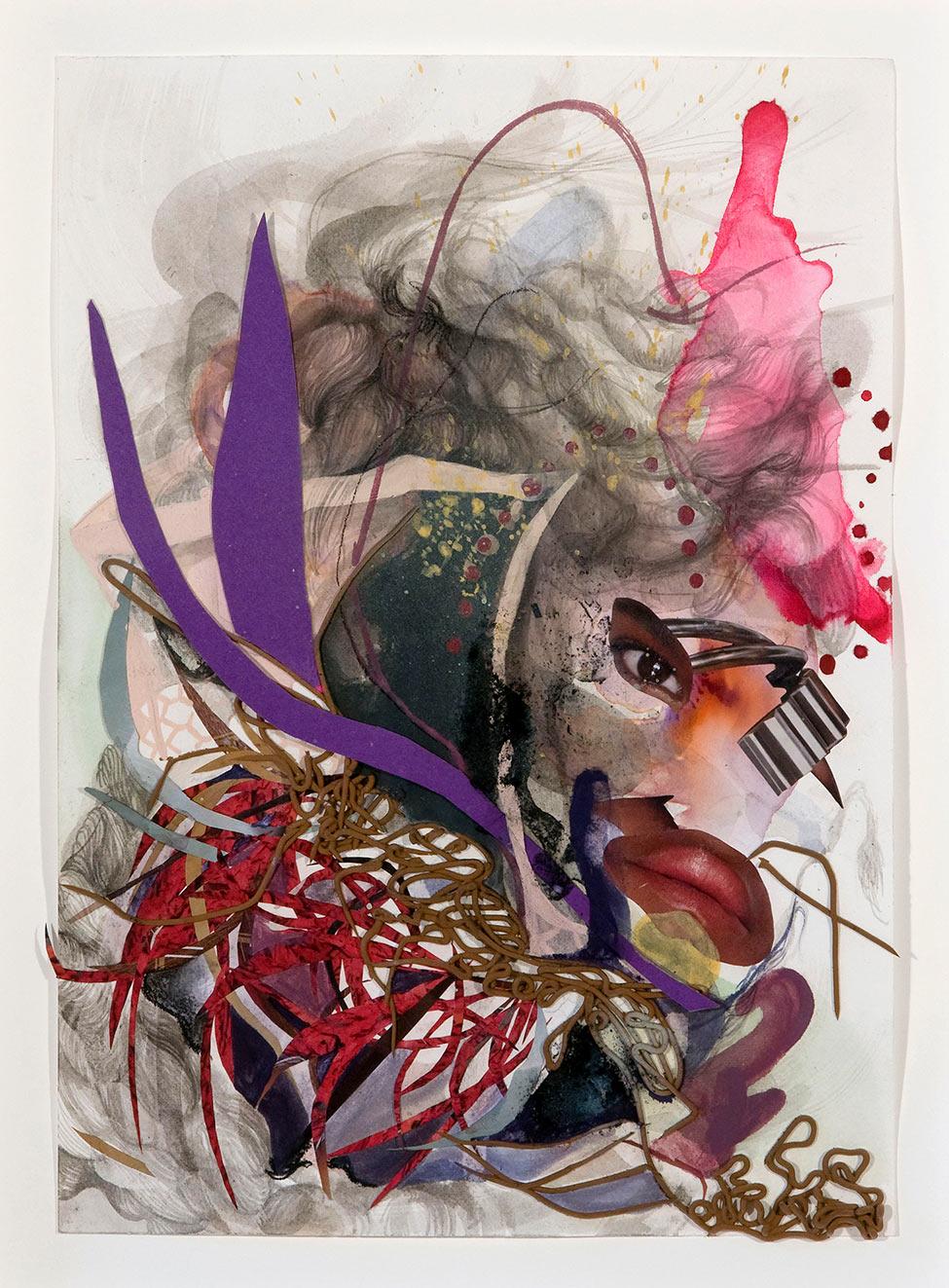
The Anthology exhibit, which remains on view through Saturday, September 13, 2025, is made possible by the New York State Council on the Arts with the support of the Office of the Governor and the New York State Legislature. Additional funding was received from the Center for Undergraduate Research Experiences (CURE) at Pace University.
All the gallery’s exhibits and events are free and open to the public. Summer gallery hours are Wednesday through Saturday 1:00 p.m.–6:00 p.m. Please check the gallery Instagram for the University holiday closures. The gallery is in Lower Manhattan at 41 Park Row.
About the Pace University Art Gallery
Founded with the conviction that art is integral to society, the Pace University Art Gallery is a creative laboratory and exhibition space that supports innovation and exploration for both artists and viewers. Open to students, staff, and faculty from across the Pace campuses and, equally, to the Lower Manhattan community and visitors from around the world, the Art Gallery encourages personal investigation and critical dialogue via thought-provoking contemporary art exhibits and public programming. Enhancing the Art Department's Bachelor of Arts and Bachelor of Fine Arts programs, the Art Gallery offers students real-world opportunities to exhibit their own art and to work directly with professional artists to install and promote exhibitions. All exhibits and events are free and open to the public.
About Dyson College of Arts and Sciences
Pace University’s liberal arts college, Dyson College, offers more than 50 programs, spanning the arts and humanities, natural sciences, social sciences, and pre-professional programs (including pre-medicine, pre-veterinary, and pre-law), as well as many courses that fulfill core curriculum requirements. The College offers access to numerous opportunities for internships, cooperative education and other hands-on learning experiences that complement in-class learning in preparing graduates for career and graduate/professional education choices.
About Pace University
Since 1906, Pace University has been transforming the lives of its diverse students—academically, professionally, and socioeconomically. With campuses in New York City and Westchester County, Pace offers bachelor, master, and doctoral degree programs to 13,600 students in its College of Health Professions, Dyson College of Arts and Sciences, Elisabeth Haub School of Law, Lubin School of Business, Sands College of Performing Arts, School of Education, and Seidenberg School of Computer Science and Information Systems.
Making Minors Major: Nishchay Ingale ’27
Not every leader starts with a business major—meet the students turning Lubin minors into major wins.
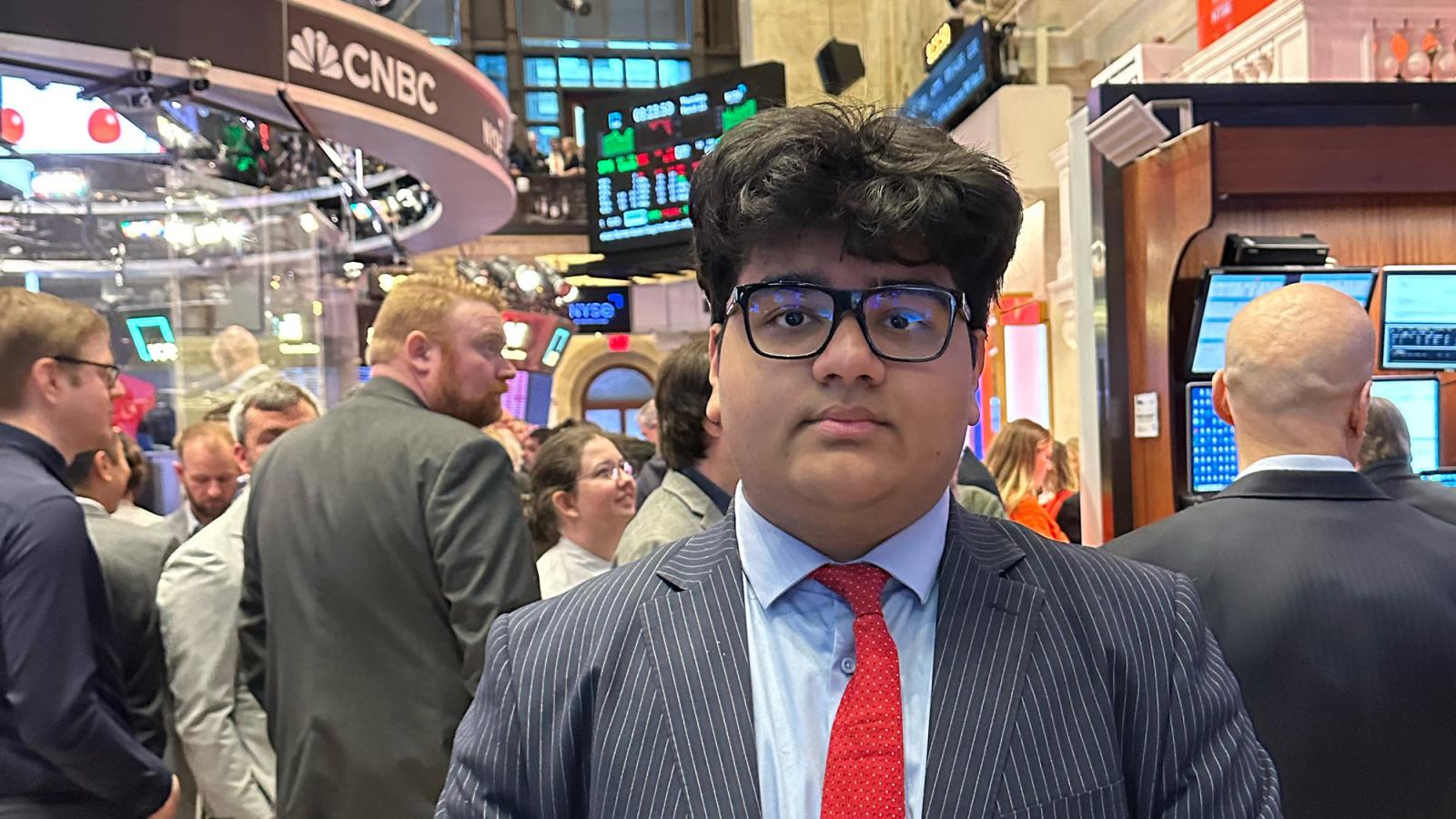
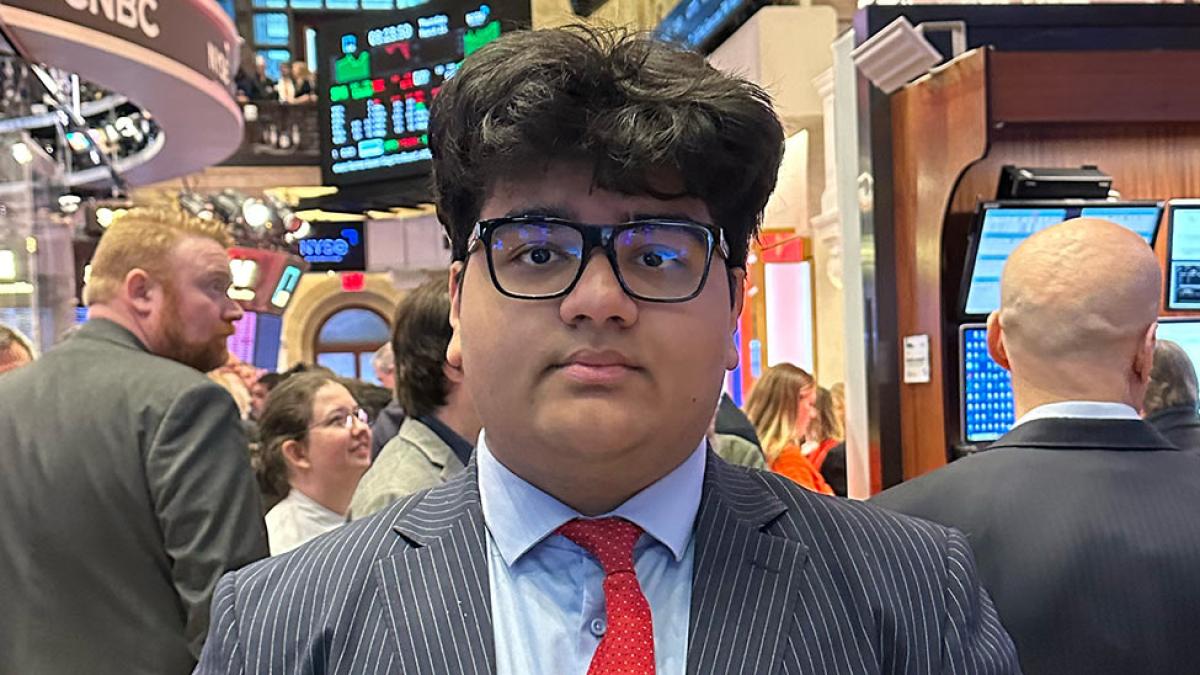
Nishchay Ingale
Class of 2027
Pronouns: He/Him
Currently Studying: Bachelor of Science in Business Economics with a Minor in Finance
Why did you choose Pace University and the Lubin School of Business for your minor?
Growing up, I always envisioned myself working on Wall Street. Pace University’s location in the heart of downtown Manhattan—just steps from the New York Stock Exchange—made it the perfect choice. The University’s strong ties to the financial industry and its deep-rooted presence in the city’s business landscape made it the ideal place to study finance and launch my career.
As one of the youngest interns at the New York Stock Exchange, how has this experience shaped your career goals?
I’ve been interested in financial markets since middle school, but joining the New York Stock Exchange helped me grow even more—both personally and professionally. It’s been a strong start to my trading career. I receive valuable advice from my colleagues every day and continue to learn something new at the Exchange, which I know will help me become a great trader in the future.
Can you tell us more about launching Ingale Research? What inspired you to start your own equity research firm, and what are your goals for its future?
This summer, I launched Ingale Research—an independent firm focused on deep dives into company fundamentals and financials. We have analysts covering various sectors to help us understand the full scope of this beautiful market. My goal isn’t to give financial advice, but to provide high-quality, in-depth research reports that allow others to make their own investment decisions. Through this process, I aim to keep growing and evolving as a trader.
To become successful, you don’t need to be talented; you need to be obsessed with winning. Obsession always beats talent.
You recently helped initiate a potential academic partnership between Pace and the Chartered Market Technician (CMT) Association. What sparked this initiative, and what do you hope it brings to fellow students?
While working on the floor of the New York Stock Exchange, I connected with a board member of the CMT Association, who introduced me to the CEO. I then helped connect our dean with the CMT’s leadership. I believe this partnership has great potential—it can help fellow students prepare for the CMT exam and enhance their careers. I also think Pace and the CMT Association can collaborate on research that contributes meaningfully to the trading industry.
What has it been like preparing for financial trading exams at such a young age, and what motivated you to pursue them so early in your career?
Preparing for these exams while attending university and working at the NYSE was incredibly stressful and demanding. But I believe pressure is a privilege—it means people are counting on you to succeed. I come from a very supportive family, and my parents have always believed in me. Their encouragement and the values they instilled in me motivated me to take on these challenges early in my career.
What has been your favorite opportunity at Pace?
I’ve really benefited from our networking and advising events, where I’ve had the chance to meet industry professionals and learn directly from them. I think our alumni network at Pace is very strong, and it’s been great connecting with successful graduates and gaining their insight.
How has Lubin supported or enhanced your professional development so far—whether through coursework, faculty, or networking?
Lubin has had a tremendous impact on me. What stands out most is the experience of the faculty—they didn’t just teach from books, they coached me through interviews, real-world scenarios, and how to handle high-pressure situations. Access to seasoned Wall Street professionals who visit campus and share real advice is something truly unique to Lubin.
What does #LubinLife mean to you?
To me, #LubinLife means excelling both inside and outside the classroom, sharpening my competitive edge, growing personally and professionally, making my family proud, and—most importantly—winning.
Do you have any advice for other Lubin students?
To become successful, you don’t need to be talented; you need to be obsessed with winning. Obsession always beats talent.
Connect with Nishchay:
Housing 101: First-Time Residents
Moving out for the first time is stressful—for you and your family! Here are a few things you need to know as a first-year residential student moving on to a Pace campus.
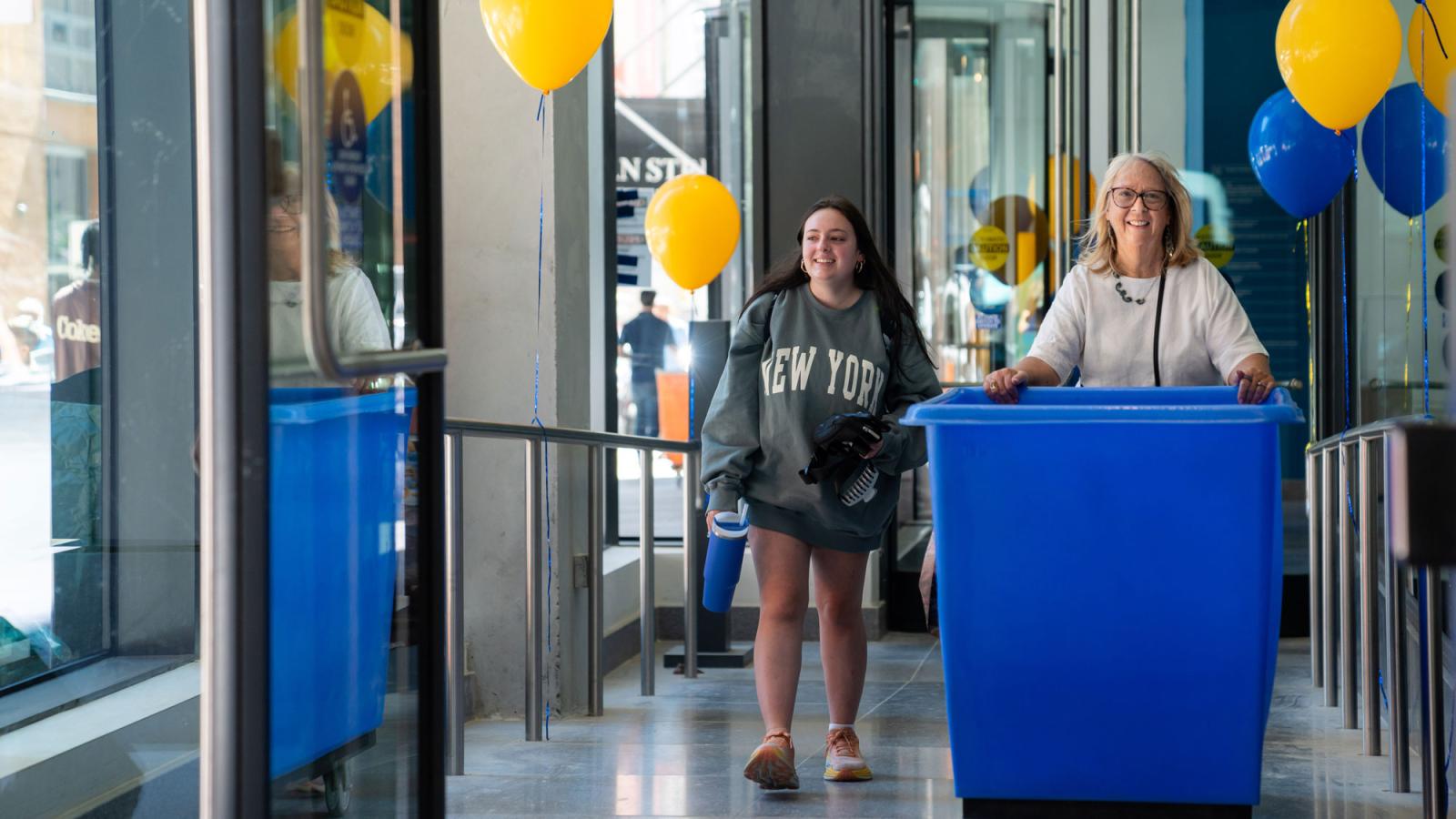
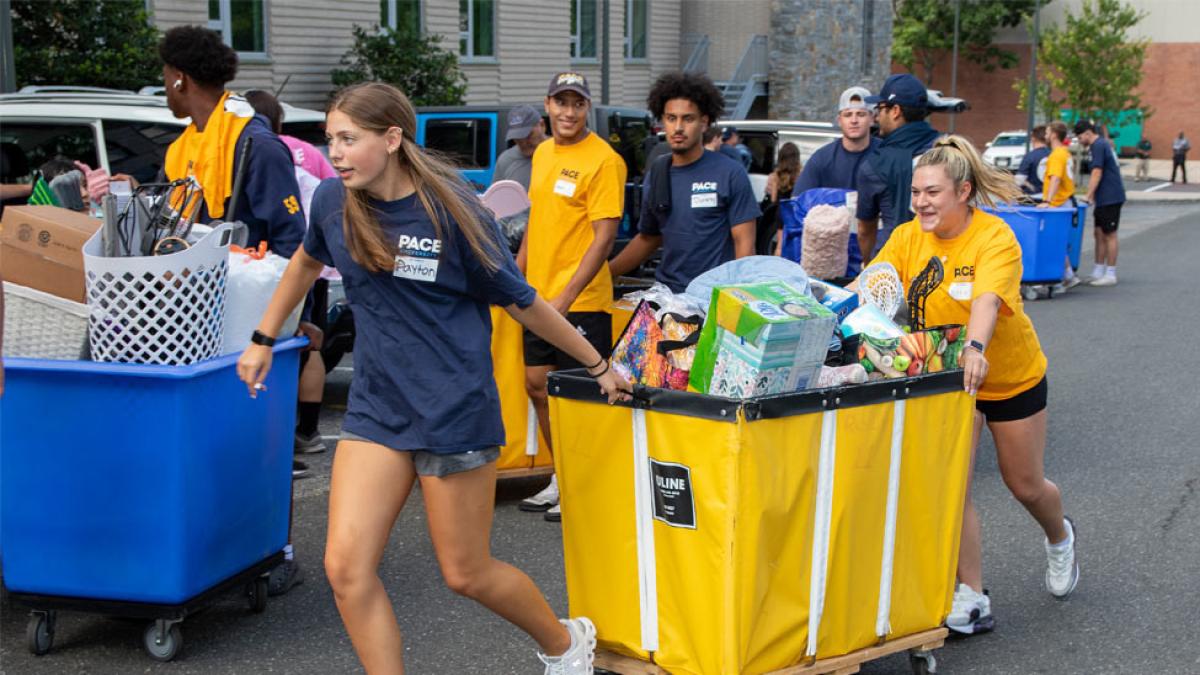
From quads to doubles and from townhouses to private rooms, moving out for the first time is stressful—for you and your family! Here are a few things you need to know as a first-year residential student moving on to a Pace campus. Please be sure to check your Arrival Checklist (located on the MyHousing portal) regularly through the summer to ensure that you and your student are meeting all the checklist items as they are available.
- What to Bring (And not bring!)
- On-Campus Mailing Addresses
- FAQ for Living in Residence
- Important Resources for Residential Students
- Contacting Residential Life and Housing Operations
And if you still haven’t found the info you were looking for, please refer to our exhaustive Guide to Residential Living (PDF).
What to Bring (And Not Bring!)
One of the great things about having campuses in New York is that we’re close to all sorts of stores—if you’ve forgotten something, if you got something for your space but it doesn’t work as well as you’d hoped, if you thought your roommate was bringing something and they didn’t, it’s okay. There are plenty of stores surrounding all of our campuses and if you don’t have something you need on the first day of the semester, it’s not the end of the world. Plus, during your first few weeks on campus, Student Engagement hosts shopping trips so you can grab any of the last-minute items you didn’t get to bring. On top of that, you can have just about anything shipped to your residence hall relatively quickly. For the full list of items to bring or not bring, please review this packing guide.
So, let’s get into it:
Do Bring:
- Your brand-new Pace ID. You'll get your Pace ID from Housing staff when you move in. To make sure your ID is ready and waiting for you, submit your ID photos online using the Online Photo ID Submission Webpage.
- Bedding and linens. All of our beds in all of our residence halls use Twin XL sheets.
- Clothing. You don’t need to bring all of your winter-wear at once. New York stays pretty warm until October, so pack a hoodie and a light jacket, but save the winter coats for later in the semester. You won’t need them right away and they’ll take up valuable space. Most of our students do a big wardrobe switch during November break, so plan to bring home your light clothing and return ready for the cooler months. Don’t forget your shower shoes!
- Personal items and toiletries. That’s your body wash, shampoo, shower poufs, razors, cosmetics, toothpaste, face masques, menstrual items, chargers, medication (prescription and OTC), band aids, sunscreen, condoms, emergency cash, tweezers, whatever. Shower caddies are the way to go for keeping all of your bath stuff organized.
- Decorative items. Half the fun of having your new space is decorating it to your personal tastes. We love this! We encourage it. We want you to do it in a way that doesn’t damage our walls or result in a fine at the end of the academic year. That said, be thoughtful about how you are mounting posters, etc. Be careful with the paint in the rooms and make sure you don’t damage anything.
- Functional things. Plan to bring surge protectors (limit 2 per student), ethernet cables (if the wifi is slow, you’ll thank us), hangers for clothes, laundry bags, and headphones. Another item to consider is a foldable rolling cart to help make carrying groceries or larger items easier.
Coordinate with Your Roommates:
- Shower curtains: 78'; best to chat with your roommates before purchasing!
- Televisions: We don't supply standard cable, but if you want to hook up a Fire Stick or Roku to a big screen, you'll need to provide one.
- Cleaning supplies. You are responsible for keeping your space clean. Your suite/room is yours and Pace’s janitorial team does not clean it. Talk to your roommates about who is bringing what to keep it clean—think paper towels, toilet paper, laundry detergent, garbage bags, Swiffer cloths, a lightweight vacuum, all-purpose cleaning fluid, glass cleaner, soap scum sprays. Find what works for you, discuss if you prefer organic versus traditional cleaning supplies and consider assigning tasks to keep your space tidy.
- Lighting. Consider bringing a desk lamp for busy work and one or more for ambient lighting. Remember: no halogen bulbs!
- Food and cooking utensils. We’re talking coffeemakers (with an automatic shut-off), food storage containers, pots and pans, microwave safe plates/bowls, disposable or reusable plates/bowls/cutlery/cups.
- Shovel/snowbrush. This is really for our residents in Westchester bringing a car to campus…while Pace’s Facilities Team handles much of the snow removal on campus (plowing the lots and roads; shoveling and salting the sidewalks and stairs), there may come a time when you just NEED to get to your car. Having a snow shovel may come in handy if you are plowed in (we try our best not to do that, but this is the Northeast). Having a snowbrush will also get your car cleaned off and road ready, so be prepared.
Don’t Bring:
- Things that will catch fire. That means hot plates, air fryers, toasters, grills, space heaters, kerosene lamps, candles, or toaster ovens. We want all of our residents to be safe and that means making sure we don’t have potentially dangerous items in residence.
- Things that will disrupt other residents. No stereo speakers or other amplification devices.
- Furniture. Pace provides all of the furniture you’ll need while living in residence. This furniture includes bedframes and mattresses, desk space, chairs, and storage drawers and/or wardrobe. Some rooms have full closets.
- Bed risers. We know they are tempting to bring to get a little extra under-bed storage, but they can be dangerous when improperly used. The good news is, our beds are adjustable. Fill out a Facilities Request Form (see the resources section below on this page) and someone from our maintenance staff will stop by to raise the bed.
- Micro-fridge: Pace provides a free-standing microwave/mini-fridge unit for suites in all of our residence halls, on all of our campuses. The only exception to this is the Townhouses on our Westchester Campus, which are reserved for upper-level students.
On-Campus Mailing Addresses
Students can receive mail and packages on campus at one of our many mailrooms. And just as an FYI, our mailrooms will accept deliveries for students prior to their arrival on campus. Here’s how to address things so you can be sure you’ll get what you need:
New York City Campus
- 15 Beekman:
STUDENT’S NAME
15 Beekman, Rm. XXXX
New York, NY 10038 - 182 Broadway:
STUDENT’S NAME
182 Broadway, Rm. XXXX
New York, NY 10038 - 55 John Street:
STUDENT’S NAME
55 John Street, Rm. XXXX
New York, NY 10038 - 33 Beekman:
STUDENT’S NAME
33 Beekman, Rm. XXXX
New York, NY 10038
Westchester Campus
STUDENT'S NAME
Pace University
99 Castleton Street*
C/O Residence Hall Name (e.g., Alumni Hall, Elm Hall, North Hall), Rm. XXXX
Pleasantville, NY 10570
*That's not a typo. Pace's Mail Services for the Westchester Campus are housed in the town of Pleasantville, NY.
Location of Student Mailrooms
New York City Campus:
- 15 Beekman, 25th Floor, (212) 346-1491
- 33 Beekman Street, Ground Floor, (646) 218-5296
- 182 Broadway, 4th Floor, (646) 218-5413
- 55 John Street, Ground Floor, (646) 218-5296
Westchester Campus:
- Elm Hall, Ground Floor, (914) 773-3865
FAQ For Living in Residence
We know you have a lot of questions, and we want to do our best to get you the info you need. Check out our abridged list of the most asked questions related to living on campus. If you still need more info, check out the full list of FAQ here.
How will housing communicate with me through the summer before I start classes?
Housing communicates to students through their email throughout the summer. We email students at BOTH the personal email address they provided to admissions (through the admissions process) and their Pace University email (which they receive once they are admitted to the University). When completing the housing application, students may (but are not required to) provide an email address for a Parent or Guardian if they would like them copied on the Housing-related emails that we will send during the summer. The identified email will only be sent copies of the standard on-boarding emails sent by the Housing Operations Office, including any reminders we may send, and they will only receive these emails through September 1. After that date, we will no longer copy this alternate address on emails we send the student.
Additionally, a range of important housing information will be available to students through the MyHousing Portal. There, students will find an Arrival Checklist that will help them keep track of the things they need to do prior to move in. This checklist will identify what items are completed, and which have yet to become available for completion.
Where can I get info about the residence halls on Pace’s campuses?
Take a peek at what we offer by visiting the Residence Hall section of our Housing website.
When will I know where I will be placed for housing?
We will begin making assignments, and emailing them to students, in mid-June. This occurs only after students have submitted the Pre-Assignment Form, which does not become available until June 1 on the MyHousing portal. Through that form students notify us that they have completed any roommate matching in which they wish to engage, and that they are ready to be assigned a space (whether they have matched with other roommates/suitemates or not). Please note that once we begin making assignments, we will prioritize those who submitted their housing deposits by March 3, and those who (through roommate matching) have formed groups large enough to fill complete rooms or suites. Assignments will not be made immediately after a student submits a Pre-Assignment Form; the assignment process will be ongoing through the remainder of the summer.
I’ve been assigned to 15 Beekman in NYC. Can I see pictures or floorplans of my space?
Check out the virtual tours and photos of our newest residence hall, 15 Beekman. Each floor, each room, is a little different and floor plans can vary. As with any college or university housing space, a lot of furniture placement is trial and error. The most common questions we've received about 15 Beekman relate to the dimensions of the bed and the dresser.
- The bed is 80" wide x 36" deep x 36" high. The bed is adjustable. If you need more clearance under the bed, you can put in a Facilities Request ticket and someone from maintenance will help you raise the bed.
- The two-drawer stackable dresser is 24" wide x 24" deep x 20" high.
- The in-suite showers require a shower curtain
- There are no closets in the common space; furniture is provided for personal storage.
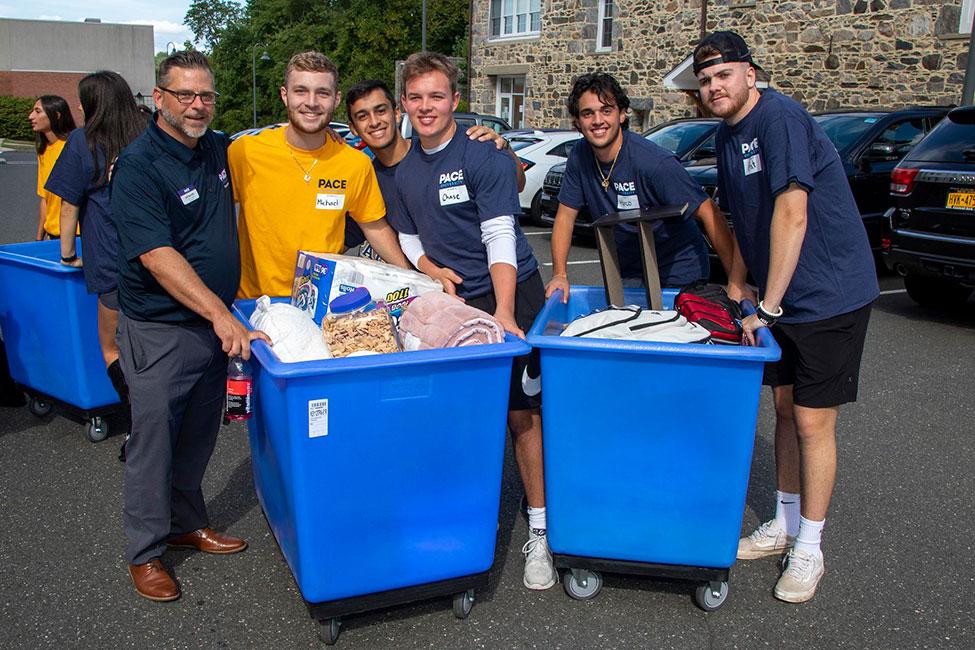
I’ve been placed in a temporary quad room. How long will I be assigned to a temporary or extended occupancy quad?
We cannot say for certain how long students will remain in these kinds of rooms. Our experience demonstrates that we are likely to have many vacancies occur in our first-year student housing within the first several weeks after move-in day. As soon as we confirm a student has cancelled, we begin the process of moving students out of these extended occupancy rooms. And, if you happen to LIKE where you’re living after you move in, you are not required to move out.
Instead of moving in to a temporary or extended occupancy quad, can I just commute from home and see if anything else opens?
This is possible, but we strongly advise students to move in and remain on campus while waiting to be de-quadded. If a temporary or extended occupancy room does not have all residents present (4 in a temp quad), then it will not be prioritized for de-quadding. If you do decide to wait it out at home, you must email the Housing Operations Staff to make sure that the housing office is aware of your plans, and that your guaranteed space is not offered to another student.
Can I change my room assignment?
Our experience shows that even if a student is unhappy with their original housing assignment, after taking time to adjust to their environment and meet their roommate, floor mates and resident assistant (RA) the vast majority of students no longer wish to move.
I want a single–how do I get one?
There are very few single rooms in Pace housing. Most are selected by upper-level students during the room selection process (the process where our current residents choose their rooms for the following year). First year students and transfers are generally not eligible for single rooms. Students who require a single room due to medical need must complete the medical accommodations application process with Student Accessibility Services to have their accommodation need assessed.
Am I guaranteed to be placed with the person or people I list as preferred roommate(s)?
No, but we will work very hard to place you together. We only grant reciprocal requests, meaning you can only be placed with another person if that person is also guaranteed housing and that person also selected you. For this reason, it is important to communicate with the people with whom you wish to live and ensure that they list you, too.
What do I do if I am interested in a Gender Affirming Roommate Match?
In keeping with the mission of Pace University to promote and support inclusion, the Office of Residential Life and University Housing Operations allows participation in Gender Affirming Roommate Matching for students who desire housing placement that is based on a broader and more inclusive definition of gender and gender identity.
Gender Affirming Roommate Matching provides participating students with the opportunity to be placed in housing in an environment that is welcoming to gender affirming identities. Students who seek a gender affirming assignment should consider the following guidelines explained on our Gender Affirming Roommate Matching page before deciding whether or not to participate in the process. Students who do wish to participate in this process MUST:
- Indicate (in the Housing Application) that you wish to have access to the Gender Affirming Roommate Matching Participation Form. This will be a question to which applicants must respond either Yes or No in the Housing Application. Upon indicating that you wish to have access to it and submitting your Housing Application, the Gender Affirming Roommate Matching Participation Form will be available to you under the Applications and Forms menu in MyHousing.
- Complete the separate Gender Affirming Roommate Matching Participation Form. Again, this form will be available to all students who, in their completed housing application, indicated that they wish to have access to it. This form will help ensure that students fully understand the scope of what is (and is not) offered in the GA housing option. It will also collect the personal information necessary to facilitate GA roommate/suitemate matching.
When do I move in? Will people be available to assist me?
New students, including first-year, transfer, and graduate students entering Pace for the first time this semester, are asked to select a move-in appointment on the Primary Move-In Days for their campus. These are:
- New York City Campus: Friday, August 29, and Saturday, August 30, 2025
- Westchester Campus: Saturday, August 30, 2025
There will be limited exceptions made for students participating in a pre-fall program; students in these programs should follow directions provided by their program organizer.
During the move-in period, teams of Pace staff will be on-hand to help move your belongings to your room. We’ll have big rolling bins to help make the process smooth and efficient.
For information pertaining to returning student move-in, early arrival and/or late arrival, please review the latest Residence Hall Move-in Plan.
Is there a curfew in housing, or are there "bed checks"?
No. We do not check on residents each night to ensure that they are in their room, and there is no curfew. College is an adult environment, in which students are expected to manage their own coming and going. While the floor RA and the rest of the housing staff is available to provide assistance and guidance, we do not enforce any kind of curfew, nor do we conduct "bed checks."
I’ve already moved in and there’s an issue with my space. How do I contact maintenance?
Need your bed raised to make space for your giant storage container? Have a leak in your residence hall? Too hot or too cold in your classroom? Facilities is here to help. Make sure you’re connected to Pace’s network to access the Facilities Request Form, otherwise you’ll receive a 404 error.
Do I have to move all of my belongings when I leave for winter break?
No, you may leave your belongings in your room if you are coming back for spring semester! We do advise that you take home any items of value.
Important Resources for Residential Students
- MyHousing Portal: MyHousing allows you to take care of all your room arrangements—application, deposit, room assignment, roommate selection, and more—all online. Take control of your living arrangements and do it when it works for you. Log into the MyHousing Portal using your Pace credentials.
- Facilities Request Form: Report physical issues in your room or suite to Facilities. Make sure you’re connected to Pace’s network to access the Facilities Request Form, otherwise you’ll receive a 404 error.
- Housing Process for New Students: This webpage is the ultimate guide to residential living as a new student at Pace. It lays out what happens when, deadlines, forms, and so much more.
- Guide to Residential Living (PDF): This is a comprehensive list of all-things Housing and Residential life. Please check back as this guide will be updated on July 1, 2025.
Contacting Residential Life and Housing Operations
University Housing Operations and the Offices of Residential Life are separate staffs that work closely together to meet the needs of resident students.
- The Housing Operations team is a single staff that covers both the NYC and Westchester campuses. They primarily focus on student room assignments, including the room selection process for returning students, and the on-boarding and assignments process for new students. Housing Operations also works as a liaison to the campus facilities staff and oversees summer usage of the residence halls.
- There is a Residential Life staff on both the NYC and Westchester campuses. They oversee the residential experience, from move-in through the end of the year. They oversee the Resident Assistant Staff, a team of peer leaders who live in the halls.
There is a one phone number and email address to contact staff members from these offices. When contacting us, please be ready to clarify which campus you are calling for (and which building, if you are currently a resident student).
Phone: (914) 773-3676
Email: housing@pace.edu
More from Pace
Pace University provides parents and families with essential tools—Next Gen Dynamic Forms, FERPA authorization, TouchNet, and CampusESP—to stay informed, manage important processes, and confidently support their student’s academic journey.
Wondering how your student will register for classes, get involved on campus, or receive mail? Need to know about billing, insurance, or accommodations? We’ve got answers. Our FAQ guide is designed with families in mind—giving you peace of mind while empowering your student to navigate their new chapter with confidence.
At Pace, you’ve got an entire team in your corner. These are the top 10 people (and offices!) every new student—and their families—should know, right from the start.
A Journey of Growth and Purpose: Melis Ozcan '24 LLM
Initially, Melis Ozcan ’24 LLM described her main objective in pursuing her LLM as to sit for the New York Bar Exam, however, her educational experience at the Elisabeth Haub School of Law at Pace University ultimately contributed to her personal growth while also providing her with a high-quality legal education.
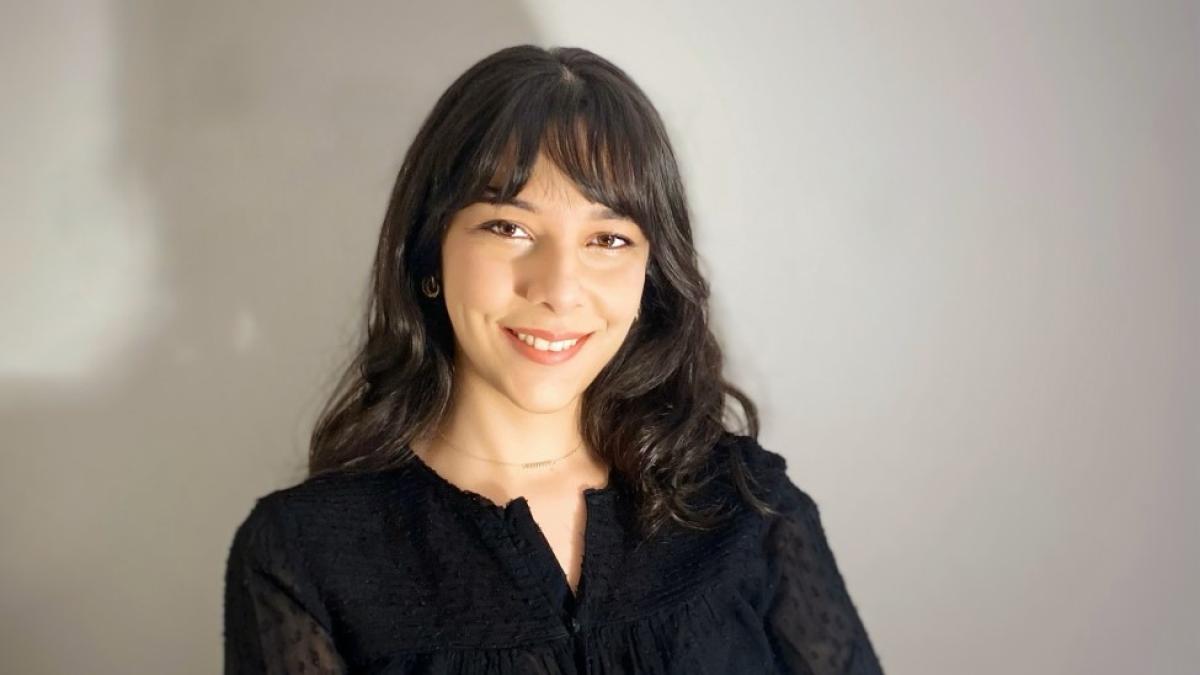
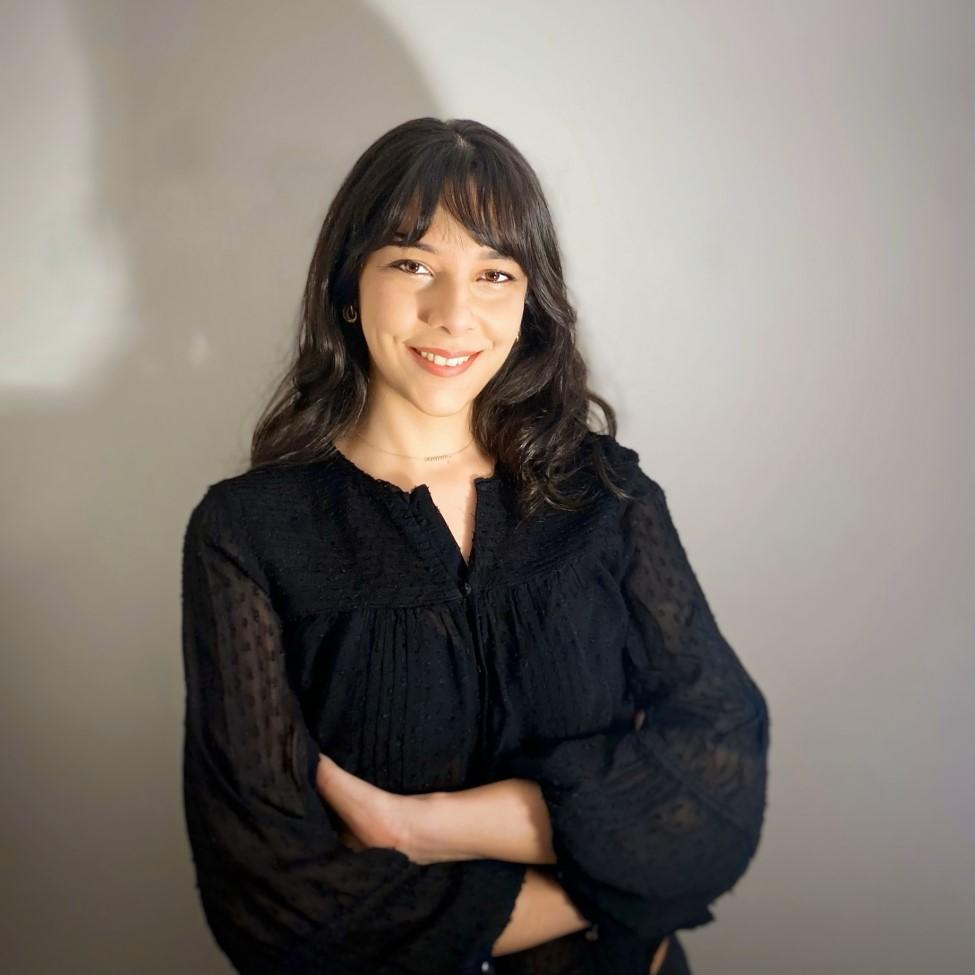
Initially, Melis Ozcan ’24 LLM described her main objective in pursuing her LLM as to sit for the New York Bar Exam, however, her educational experience at the Elisabeth Haub School of Law at Pace University ultimately contributed to her personal growth while also providing her with a high-quality legal education. “When deciding which school to attend, I consulted coworkers who had previously done LLM programs in the United States and Haub Law came highly recommended—I learned of an acquaintance, a Haub Law graduate, who had carved out a very successful career at a globally renowned company,” said Melis. “That truly impressed me. After researching the school further, I found its location and history particularly appealing.”
Once she began her studies at Pace Haub Law, Melis shares that it was a truly unique experience and exactly what she had hoped for. “My classes were comprised of lawyers from all over the world; some were recent graduates, while others were experienced attorneys with a passion for ongoing professional development. Studying and interacting with them in an academic setting, exchanging ideas and learning from each other, was incredible.” The supportive and accessible atmosphere and faculty were equally impressive to Melis. “Everyone was always willing to help. The personalized attention available made it very easy to adapt to a different culture and also a different legal system.”
While Melis enjoyed so many of her LLM classes, she describes her absolute favorite as Civil Procedure with Professor Michael Mushlin. “I am so grateful I took Civil Procedure during my first semester of the LLM program because Professor Mushlin is truly one of the most engaging and effective instructors I’ve ever encountered,” recalls Melis. “I consider him to be one of Pace Haub Law’s greatest assets, and I think everyone should experience taking at least one course with him. I’m convinced that my clear understanding of Civil Procedure played a major role in helping me pass the Bar Exam on my first attempt, saving me a tremendous amount of time and energy during my studies. Professor Mushlin has wonderful and effective teaching methods.” Melis also describes another standout class for her as Advanced Issues in Criminal Law: Sex Crimes with Adjunct Professor Fredric Green. She describes the course as incredibly eye-opening and an unforgettable experience having it taught by a highly experienced and successful prosecutor.
While Melis was an LLM student, one of her biggest pieces of advice for anyone enrolling in an LLM program is to make sure you enroll in at least one course with JD students and interact with them as much as possible. “I don’t believe you can fully experience what it’s like to be a law student in the United States without engaging with local students. While it’s invaluable to connect with your fellow international classmates, building relationships with JD students equally contributes to your academic and personal growth. By attending classes with them and actively participating in class discussions, you’ll gain far more than you might expect—for both your legal knowledge and perspective.”
I hope to continue making a positive impact in many more people’s lives as an immigration lawyer. I would not be able to do this without my LLM degree from Pace Haub Law.
Today, Melis is at Akalan Law Firm, specializing in immigration law. Immigration law has always been an area of interest for Melis. “My home country, Turkey, has hosted many refugees from the Middle East. As a result, immigration, especially human rights and asylum law—has remained a significant focus there. I’m excited to be furthering my career as an immigration attorney here in the United States, now that I’ve completed my LLM and gained a solid understanding of the United States legal system. I find immigration law particularly rewarding; being able to help individuals access more humane living conditions every day is extremely meaningful to me. I hope to continue making a positive impact in many more people’s lives as an immigration lawyer. I would not be able to do this without my LLM degree from Pace Haub Law.”
In her spare time, Melis loves going on nature hikes and exploring upstate New York’s parks, forests, and natural areas. She shares, “I really enjoy discovering these new outdoor spots, especially since this country is still new to me.” She also enjoys the more urban benefits of living in New York – including attending numerous concerts.
Arbitration Scholar, Professor Imre Szalai, Joins Elisabeth Haub School of Law at Pace University Faculty
The Elisabeth Haub School of Law at Pace University is pleased to announce that Imre Szalai, a nationally-known scholar focusing on arbitration and the Federal Arbitration Act, will join the faculty as a full Professor of Law with tenure beginning in Fall 2025. Professor Szalai will teach courses on contracts, commercial arbitration, civil procedure, and legal ethics.
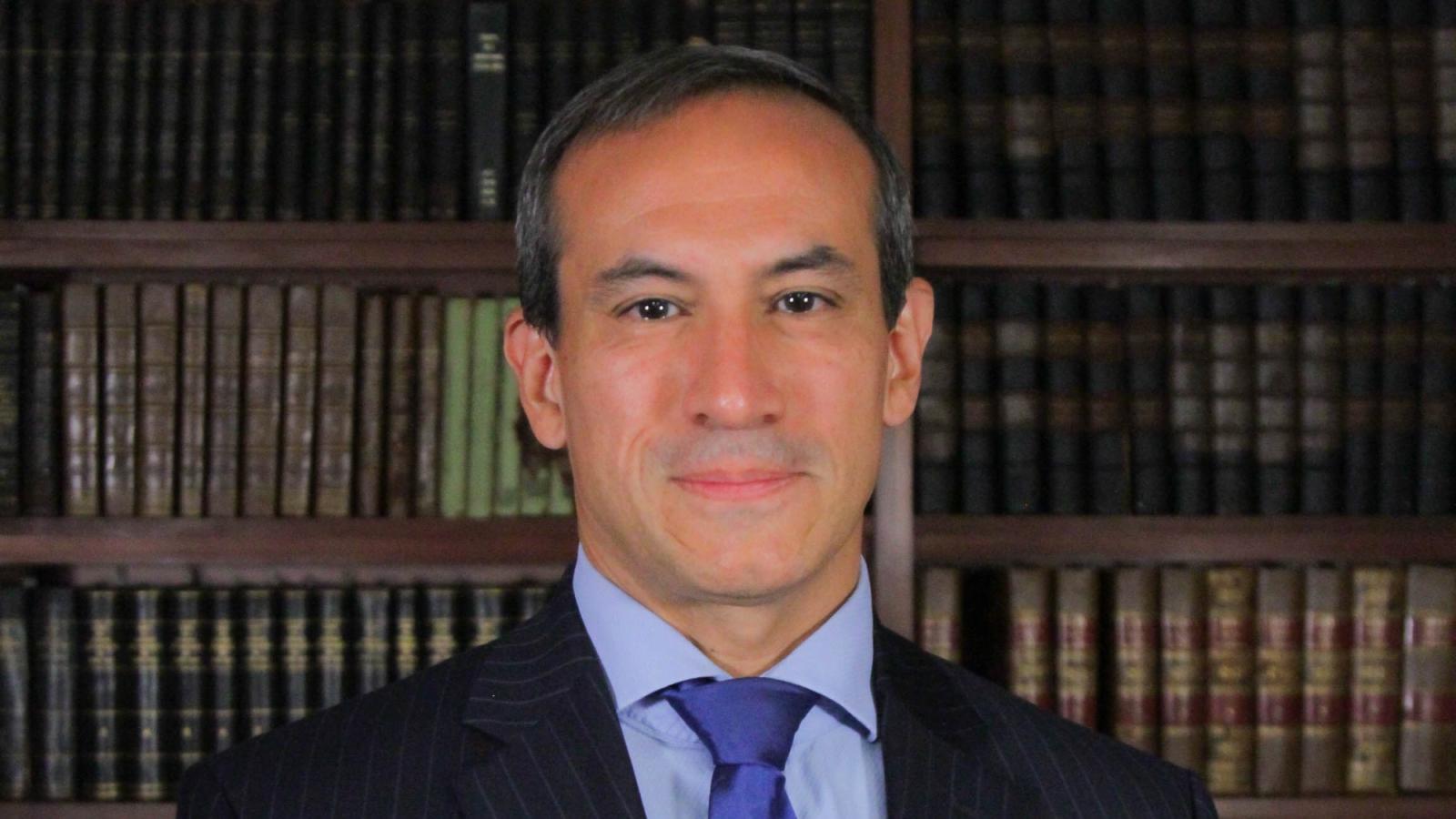
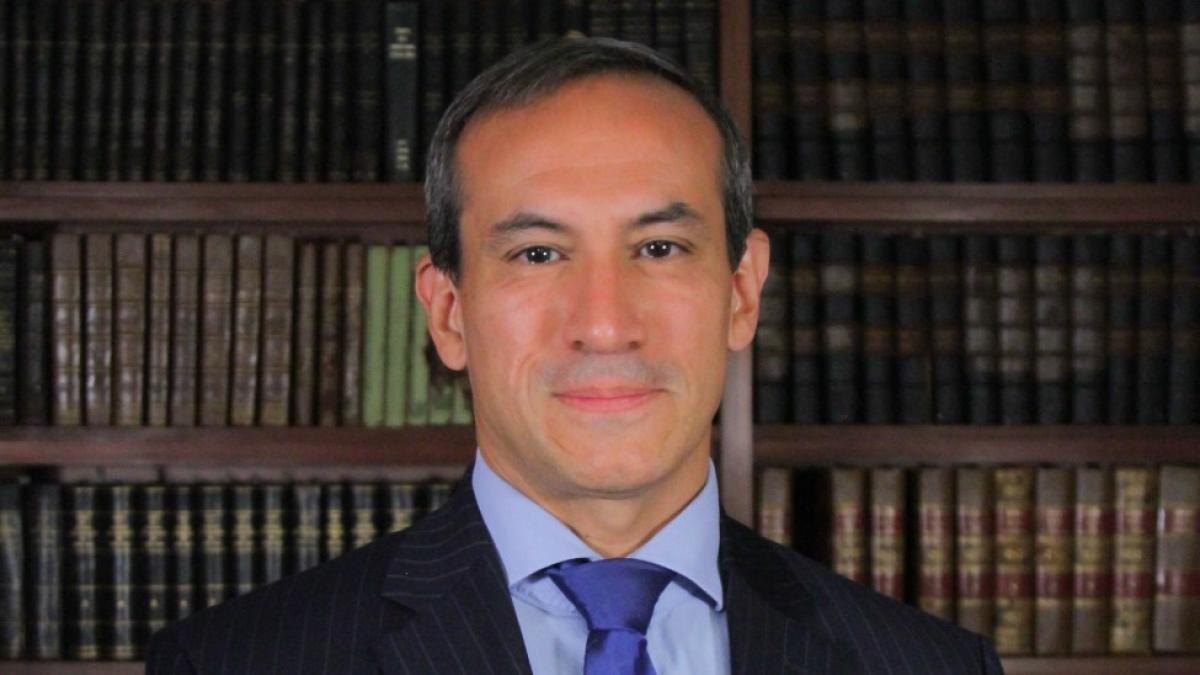
The Elisabeth Haub School of Law at Pace University is pleased to announce that Imre Szalai, a nationally-known scholar focusing on arbitration and the Federal Arbitration Act, will join the faculty as a full Professor of Law with tenure beginning in Fall 2025. Professor Szalai will teach courses on contracts, commercial arbitration, civil procedure, and legal ethics.
Professor Szalai has served as a commercial arbitrator in numerous cases, and he has written books, book chapters, and dozens of articles about arbitration. He is particularly interested in the historical development of arbitration practices and arbitration law. Working together with his students, he has written several amicus briefs regarding arbitration matters, and his work has been cited by courts of all levels and during Congressional hearings. Most recently, Professor Szalai was the Jones Walker Distinguished Professor at Loyola University New Orleans College of Law. Prior to that, Professor Szalai practiced antitrust law in New York City, and he then handled complex commercial disputes with a law firm in Miami, Florida, representing clients in connection with court proceedings and arbitration matters across various jurisdictions.
“Professor Szalai’s unique interest in the historical development of arbitration will complement Haub Law’s strong alternative dispute resolution curriculum, which has become an area of prestige at the Law School,” said Dean Horace E. Anderson, Jr. “His impactful scholarship and experience will bolster the student experience and provide additional opportunities for students to explore and develop skills in alternative dispute resolution processes. We look forward to Professor Szalai joining the Haub Law community.” In the most recent U.S. News and World Report rankings of specialty programs, Haub Law was ranked #18 for Dispute Resolution.
“New York is the birthplace and the center of commercial arbitration in the United States – Haub Law’s location and history of excellence in the field of arbitration and alternative dispute resolution is unbeatable,” said Professor Szalai. “The level of student achievement and faculty scholarship at Haub Law is extremely impressive. I look forward to joining the active scholarly community, sharing my passion with students, and helping students explore and engage with the many professional opportunities related to arbitration that the region affords.”
Professor Szalai graduated from Yale University, double majoring in Economics and Classical Civilizations, and he received his law degree from Columbia University, where he was named a Harlan Fiske Stone Scholar. He is frequently interviewed and quoted in various media outlets, including the New York Times, the Economist, USA Today, the LA Times, NPR’s Marketplace, Forbes, CNN, Money, Time, and many others. Professor Szalai also maintains a blog about arbitration.
Haub Law recently announced the expansion of its faculty with the additions of Professor Lauren Roth, a health law and business law scholar, Professor Kate Skolnick, a seasoned public defender and criminal law scholar, and Professor Gregory Antill, a criminal law and philosophy scholar. The Elisabeth Haub School of Law at Pace University is proud to have more than 130 legal experts as members of its full-time and adjunct faculty. Faculty members are lawyers with outstanding academic credentials and extensive legal experience. They are student-centered educators who bring their diverse practice experience to the classroom. Through either prior or ongoing active careers as attorneys—whether as litigators, counselors, regulators, legal reformers, policymakers, judges, clerks, or counselors—our faculty have unique perspectives informed by their work in multiple fields of law in the private and public sectors.
Pace Women’s Justice Center Raises Crucial Funds for Legal Services at Annual “Cocktails for a Cause”
On Wednesday, May 22, the Pace Women’s Justice Center (PWJC) hosted its annual Cocktails for a Cause fundraiser at the waterfront Barley Beach House, gathering community leaders, advocates, and supporters to help raise vital funds for survivors of domestic violence, sexual assault, and elder abuse.
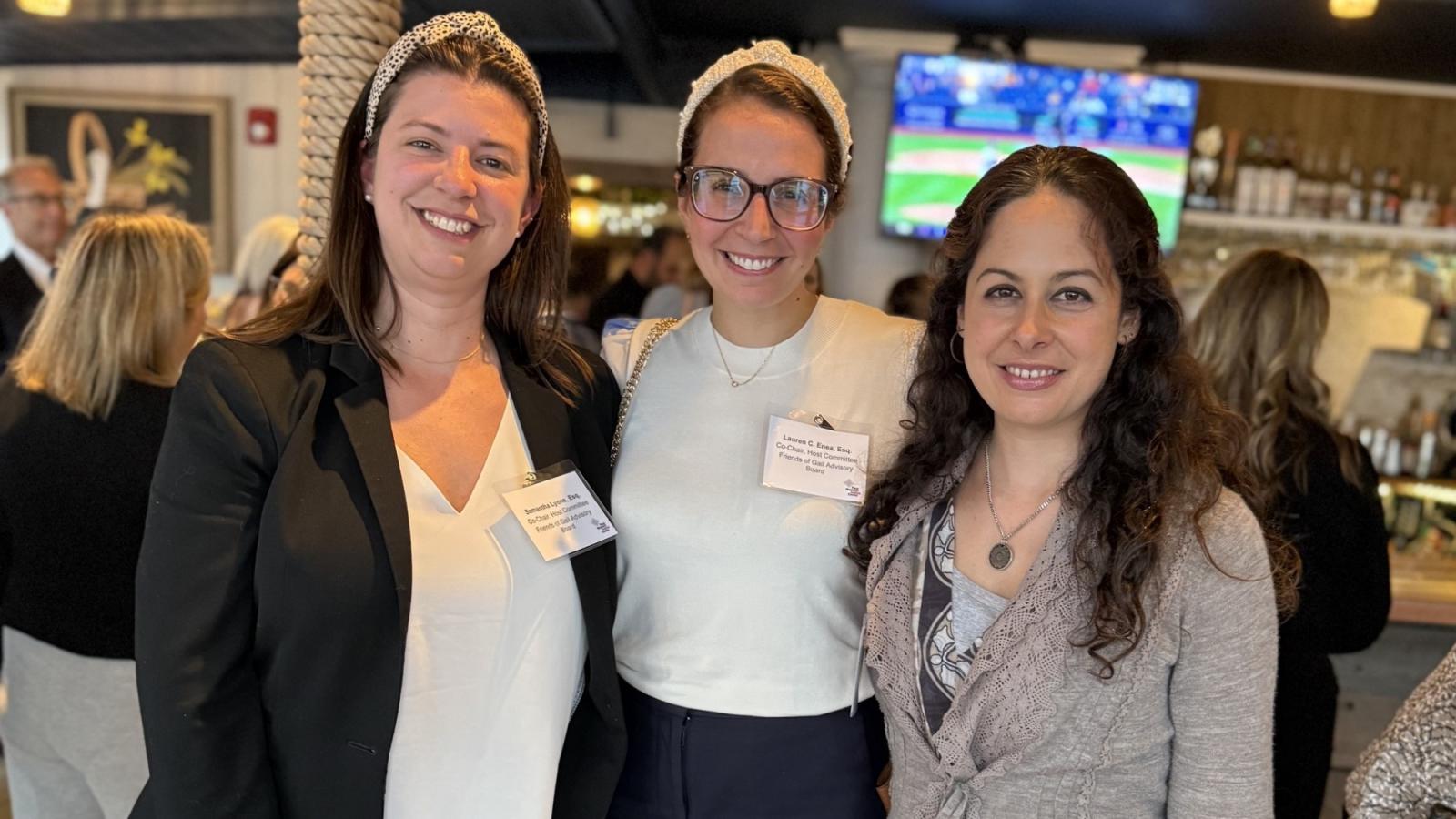
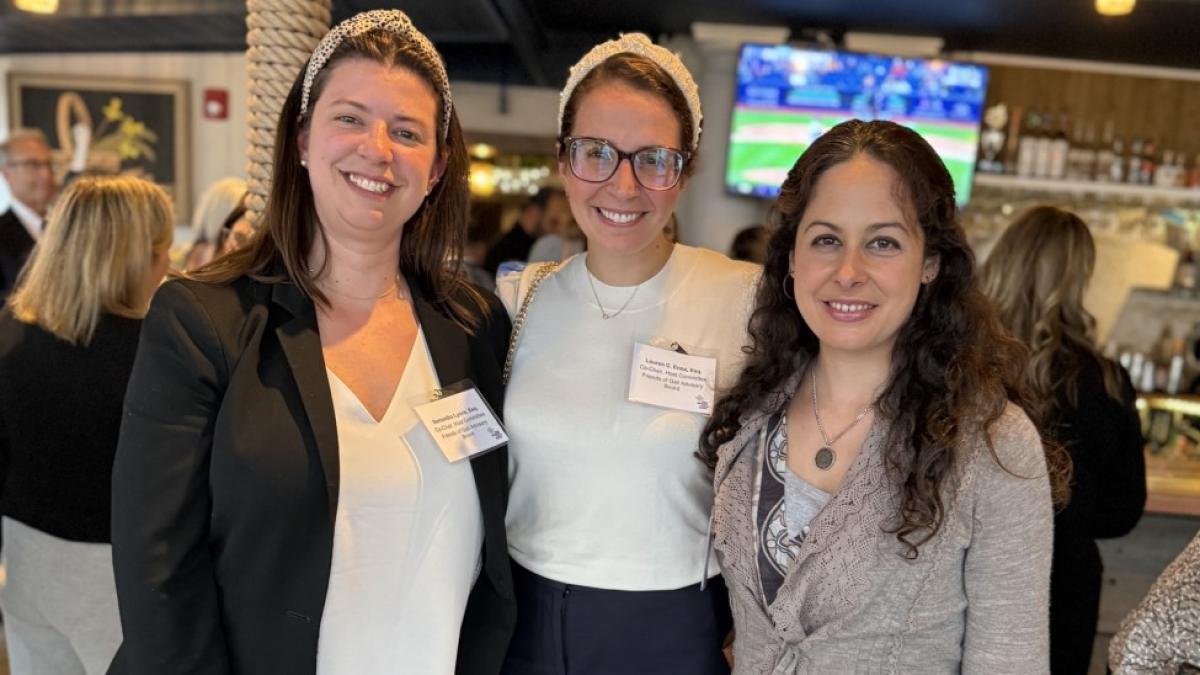
On Wednesday, May 22, the Pace Women’s Justice Center (PWJC) hosted its annual Cocktails for a Cause fundraiser at the waterfront Barley Beach House, gathering community leaders, advocates, and supporters to help raise vital funds for survivors of domestic violence, sexual assault, and elder abuse.
The event, which came at a critical moment as domestic violence cases continue to rise across Westchester County and nationwide federal funding for domestic violence services remains under scrutiny, served as both a celebration of resilience and a call to action. Guests enjoyed an evening of signature cocktails, raffles and auction items, and heartfelt stories that underscored the importance of PWJC’s mission and legal advocacy.
“Our work is more urgent than ever,” said Cindy Kanusher, Executive Director of PWJC. “Survivors in our region are still facing rising rates of violence and abuse, and it is essential that we remain equipped to meet them with legal tools, advocacy, and unwavering support. With the help of our community, we’re proud to serve more than 3,500 clients each year with free, trauma-informed legal services that protect lives and restore hope.”
The evening also featured heartfelt remarks from longtime PWJC ally and advocate Alayne Katz, Esq., whose tireless work to honor the legacy of her sister Gail—tragically murdered by her abuser—continues to drive awareness and change. Gail’s story was the inspiration behind PWJC’s original office, lovingly known as “Gail’s House,” and remains a powerful symbol of the justice PWJC continues to strive for every day.
“In early 2001, the Center memorialized Gail’s life by naming their offices Gail’s House, giving Gail a symbolic resting place,” said Alayne. “The then-Dean explained that the Center’s work with survivors of domestic violence could and would give full meaning to Gail’s too-short life. The Center has made good on that promise. They have become the largest civil legal services provider in this County, specializing in domestic violence and elder abuse. The Center’s services are often the difference between healthy families and broken lives and tragic fatalities.”
Also in attendance were Vedat Gashi, Chairman of Westchester Board of Legislators and Nancy Barr, Chair of the Human Services Committee and Co-Chair of the Families Task Force for the Westchester Board of Legislators.
“What people don’t necessarily understand is that elected officials… don’t necessarily know the subject matter like [PWJC] does… if we really want to understand the subject matter, we have to go to the experts,” said Nancy Barr, Chair of the Human Services Committee and Co-Chair of the Families Task Force for the Westchester Board of Legislators. “[Cindy] has done a fabulous job over the years of explaining why what you do at PWJC is so, so important. We have supported PWJC every year at the County Legislature, and we really believe in the partnership between government and nonprofits. This is a particularly fantastic partnership between a local organization and county government.”
This year’s Cocktails for a Cause raised over $16,000, ensuring that more survivors will gain access to emergency orders of protection, custody and divorce representation, and critical elder justice support.
PWJC thanks its generous sponsors, host committee, and every guest who helped ensure this mission continues.
Waves of Change Sponsor: The ICON Foundation of Keller Williams
Shifting Shores Sponsors: Jane Aoyama; Enea, Scanlan, & Sirignano, LLP; Jacqueline Hattar, Esq.; Law Office of Alayne Katz, P.C.
Ripple Effect Sponsors: Apple Bank; Falcon, Rappaport, & Berkman, LLP; Patricia Hennessy, Esq; Jackson Lewis; Orange Bank & Trust Company; PCSB Community Foundation
Host Committee: Lauren C. Enea, Esq. (Event Co-chair) Sarah DeRise; Jacqueline Hattar, Esq.; Cindy Kanusher, Esq.; Alayne Katz, Esq.; Alyson Kuritzky, Esq.; Stella King, Esq.; Jana Kosberg-Kleidman, Esq.; Samantha A. Lyons, Esq.; Melissa McMonagle; Amanda Rieben, Esq.; Rachel Shehy
The 2025 Trailblazers in Higher Education
President Marvin Krislov is featured in City & State’s 2025 Trailblazers in Higher Education list, which highlights leaders making a significant impact in academia. The profile notes his leadership at Pace University, as well as his prior work at the White House and his commitment to expanding educational access.
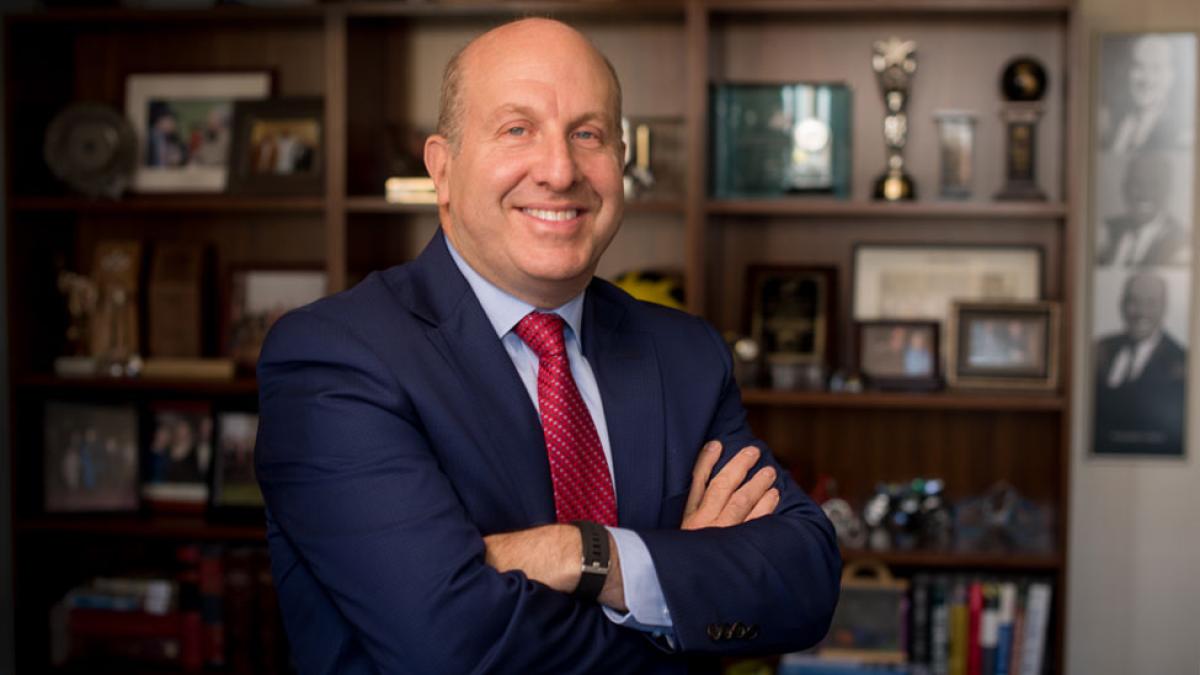
The Quiet, Extraordinary Bravery of Cassie Ventura
Glamour Magazine recently featured Cindy Kanusher, Executive Director of the Pace Women’s Justice Center, in its powerful piece, “The Quiet, Extraordinary Bravery of Cassie Ventura.” In the article she reflects on the courage it takes for survivors to come forward publicly and how Cassie Ventura’s testimony underscores the ongoing stigma surrounding domestic abuse and the urgent need to believe survivors.
